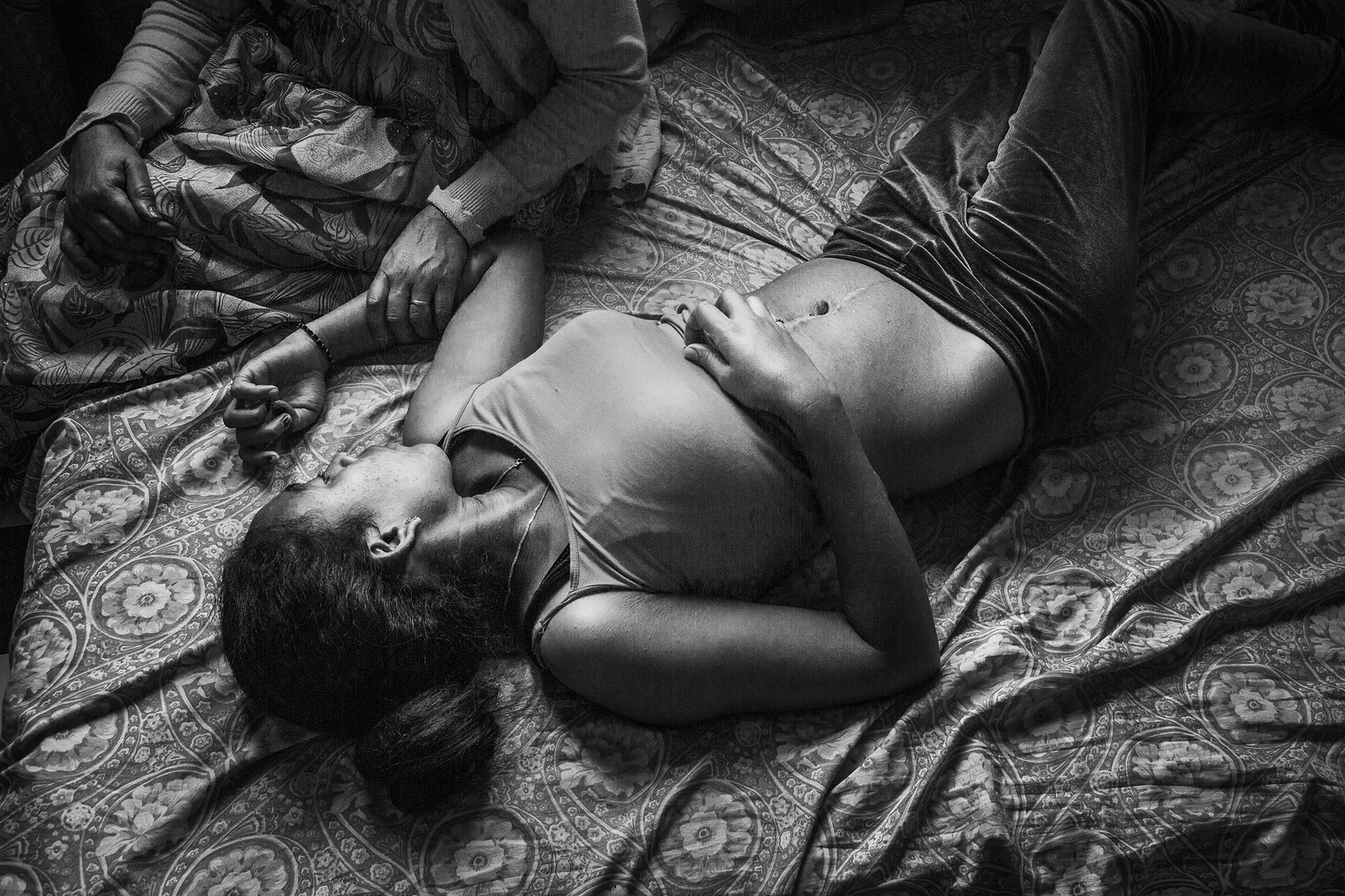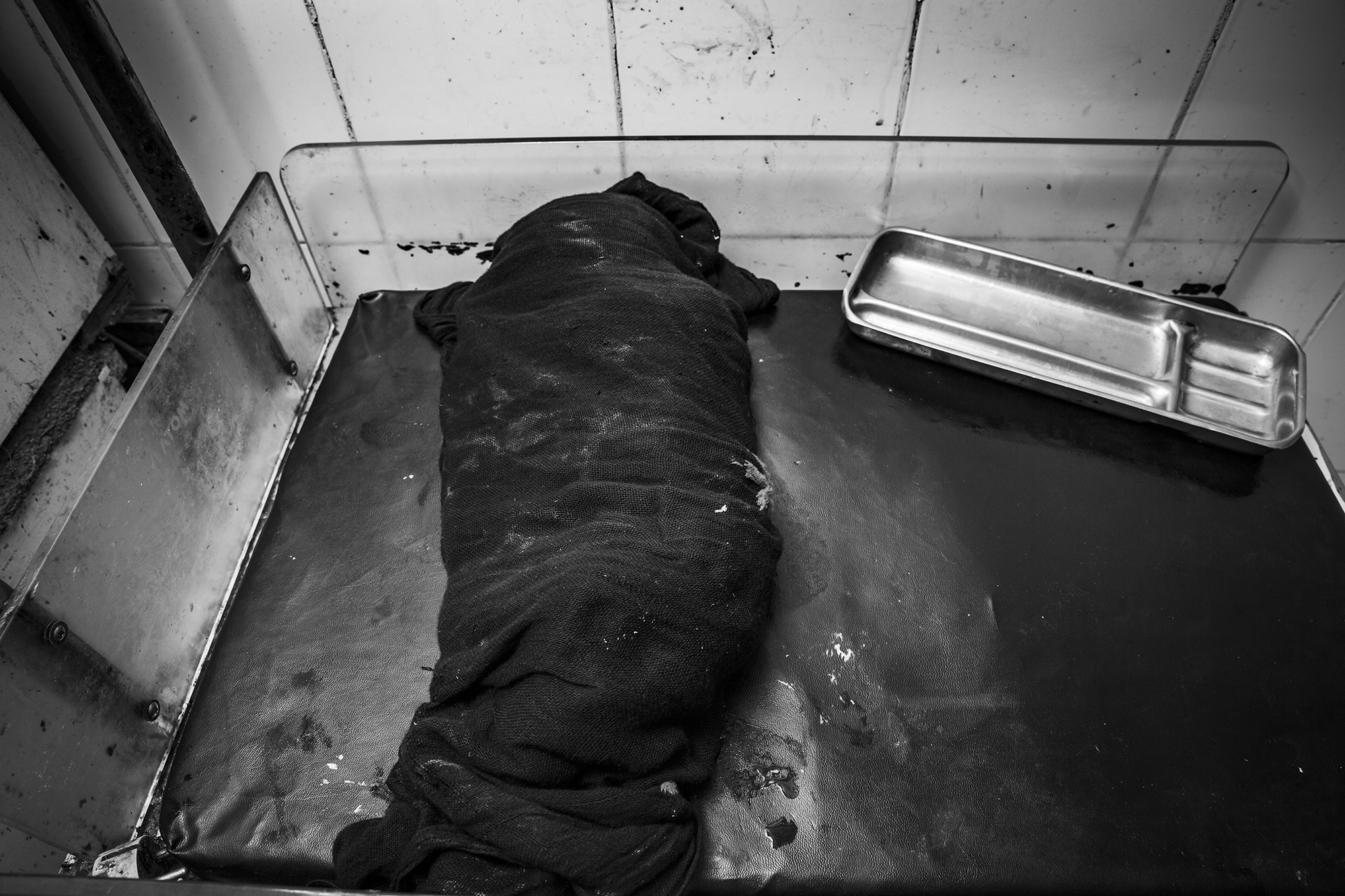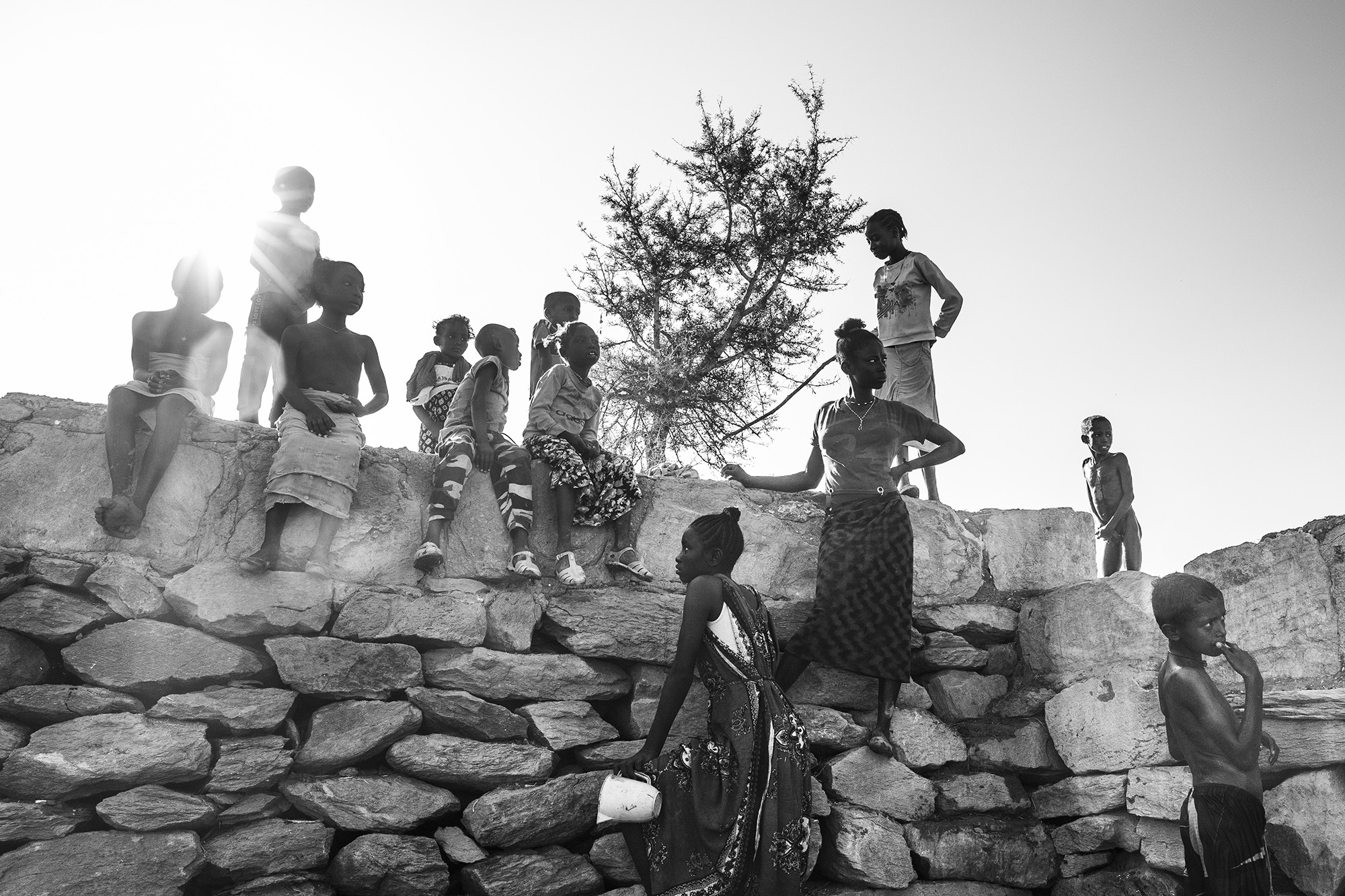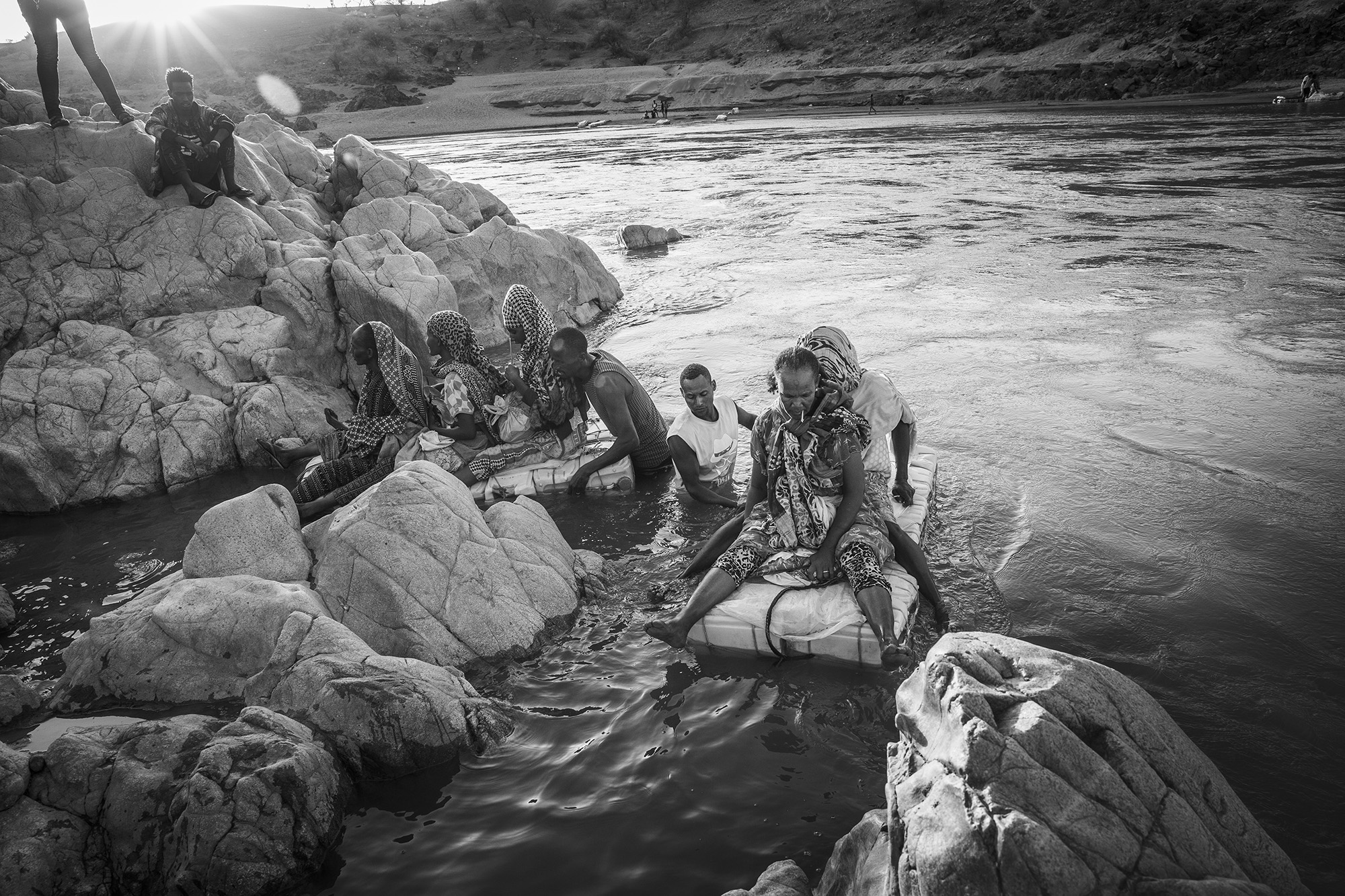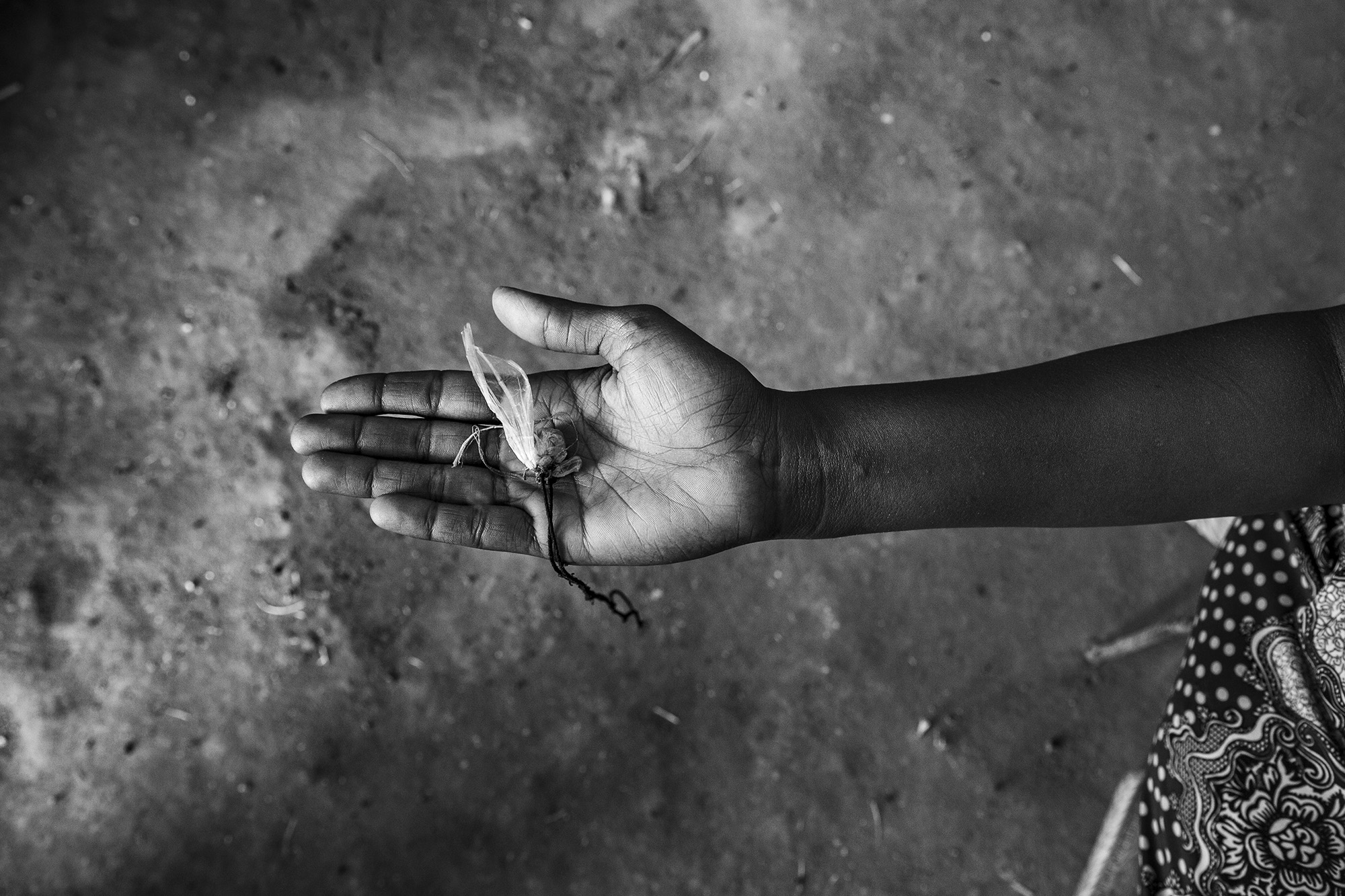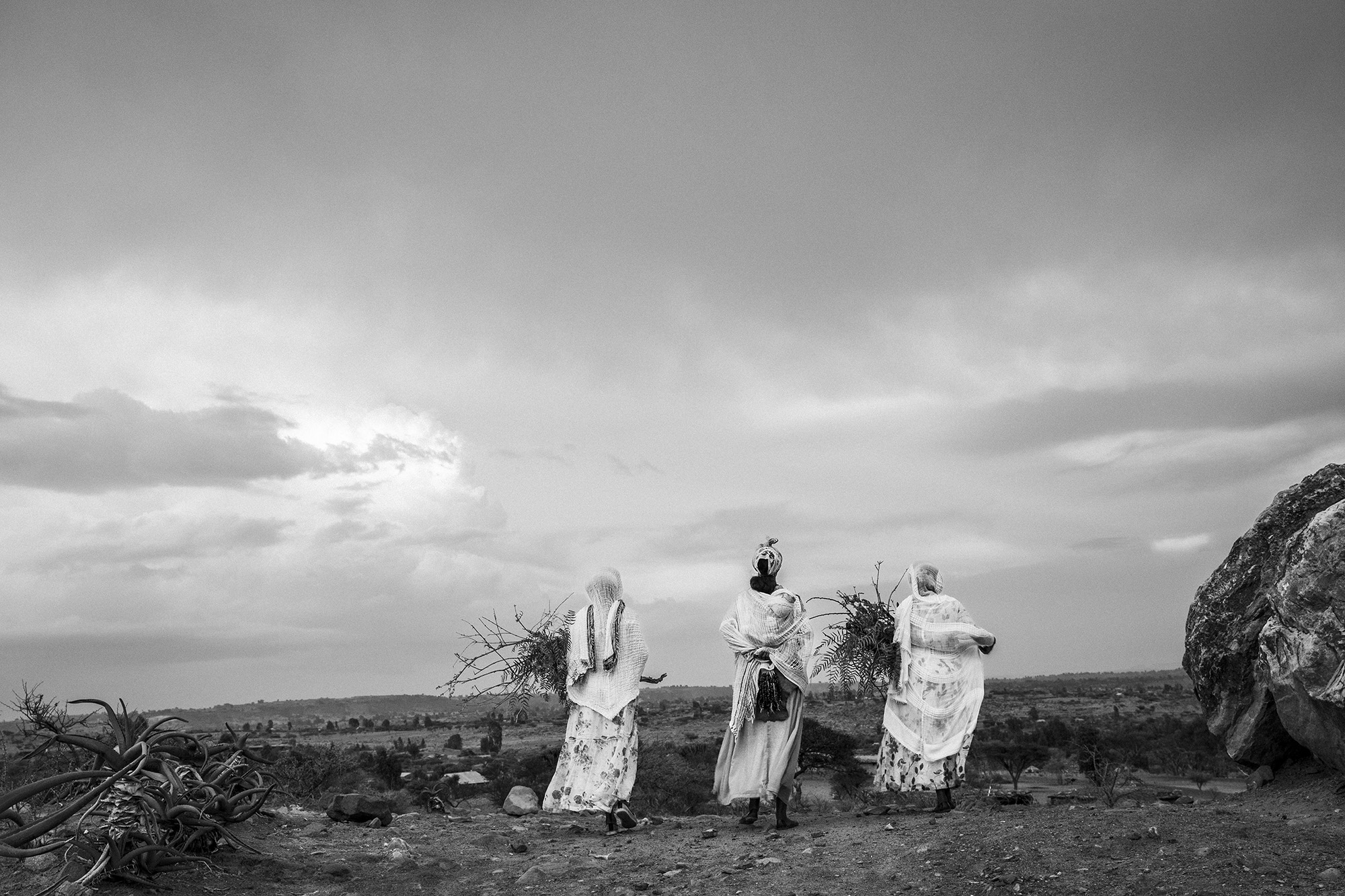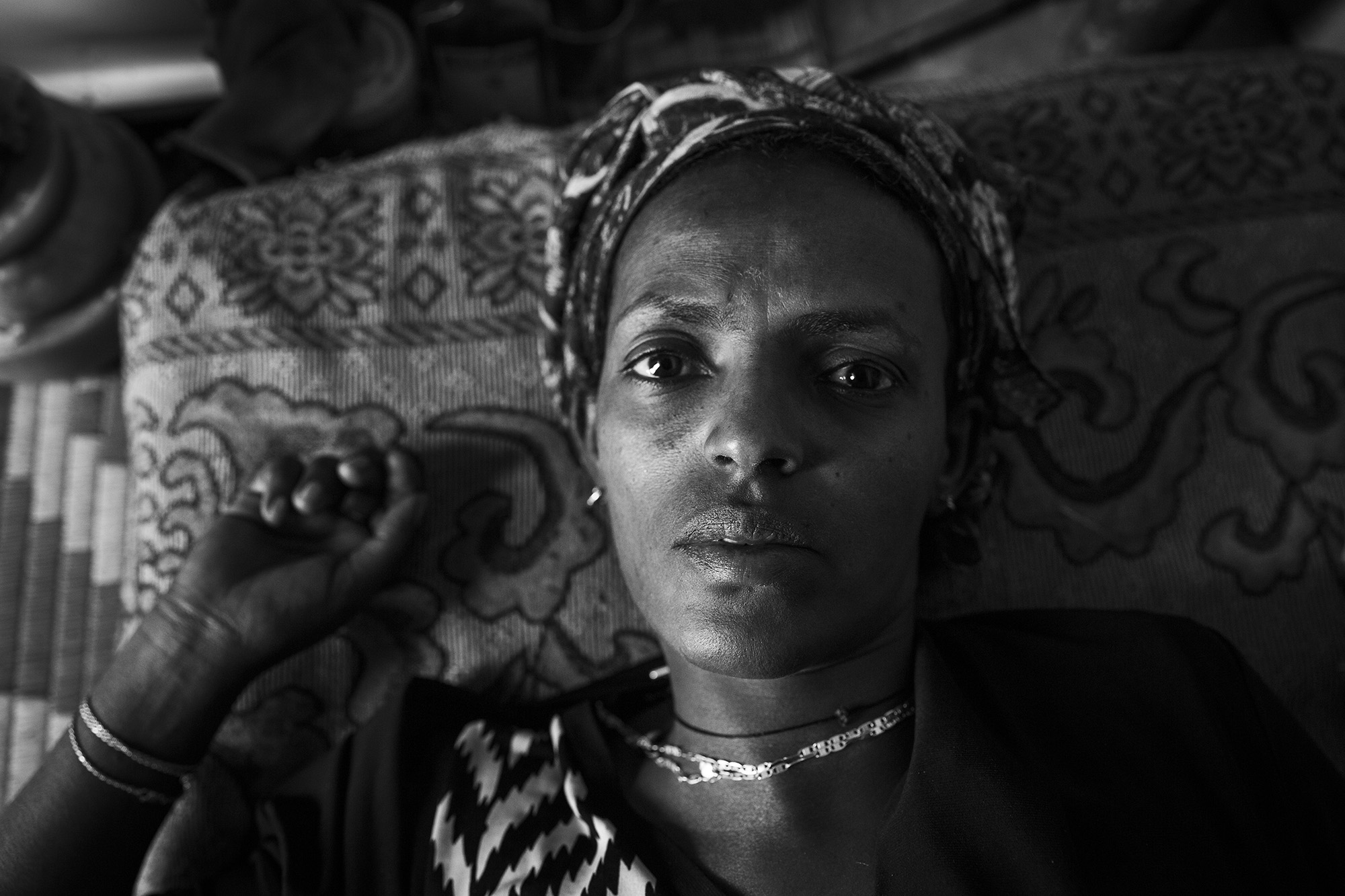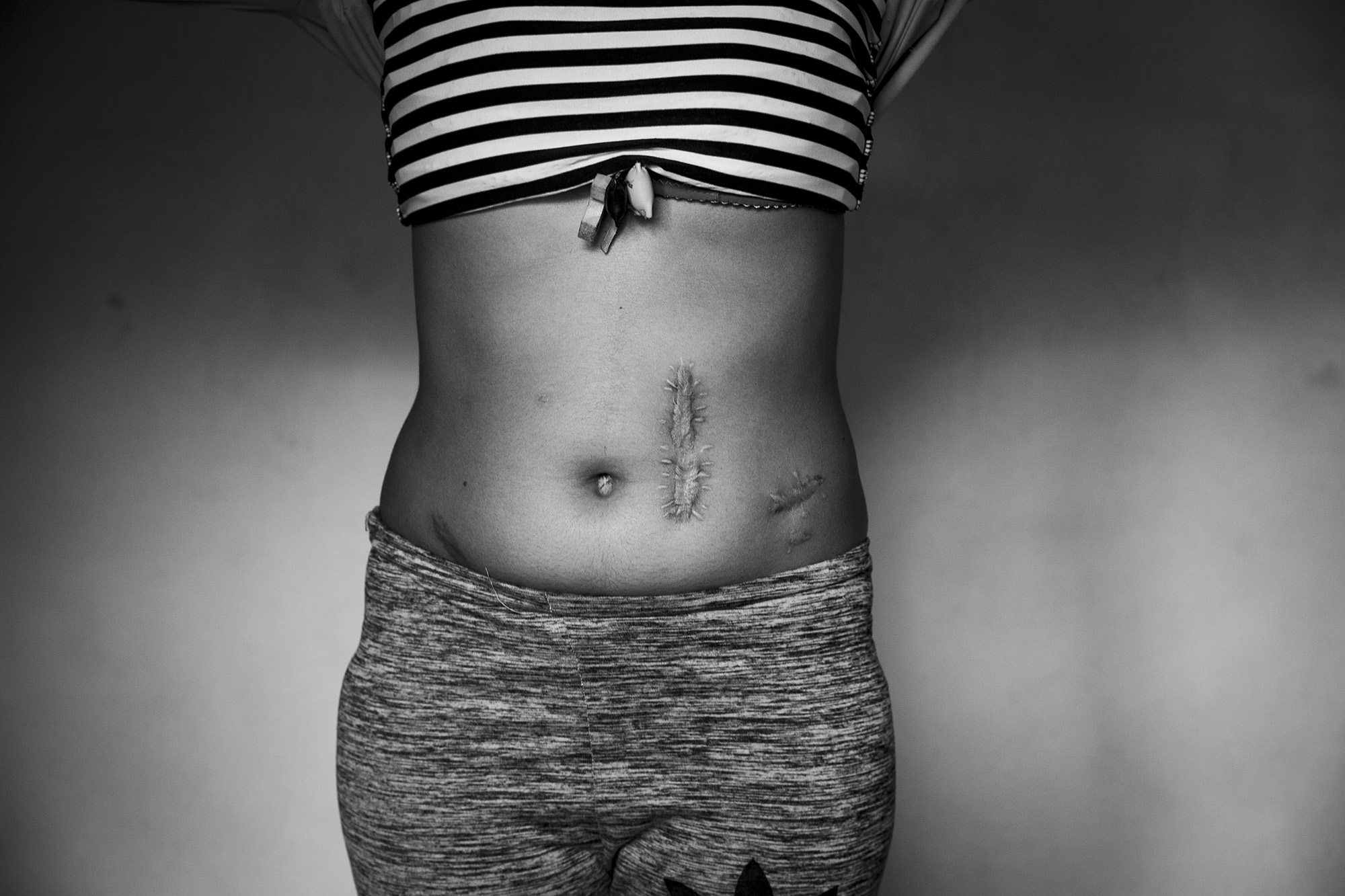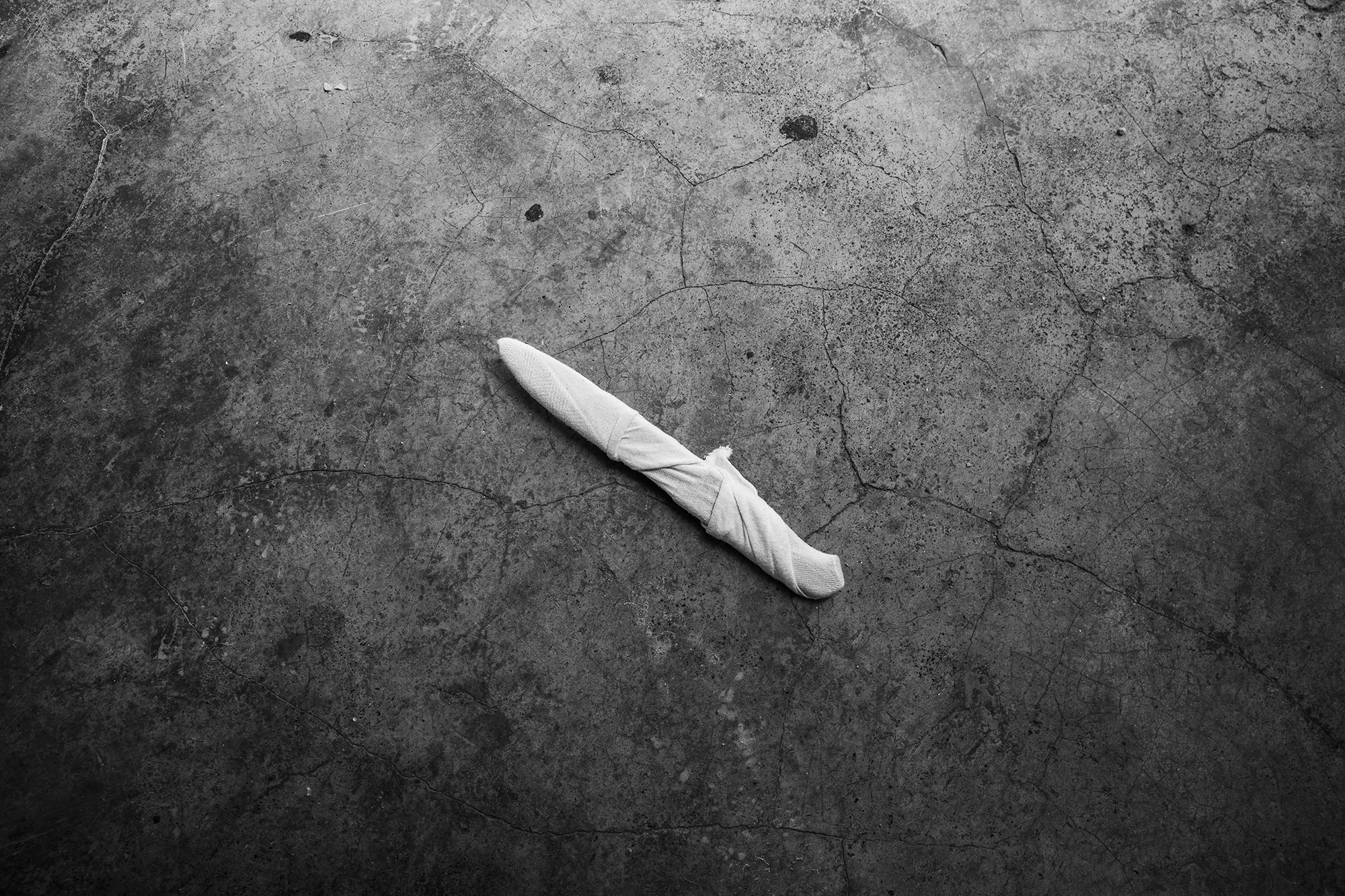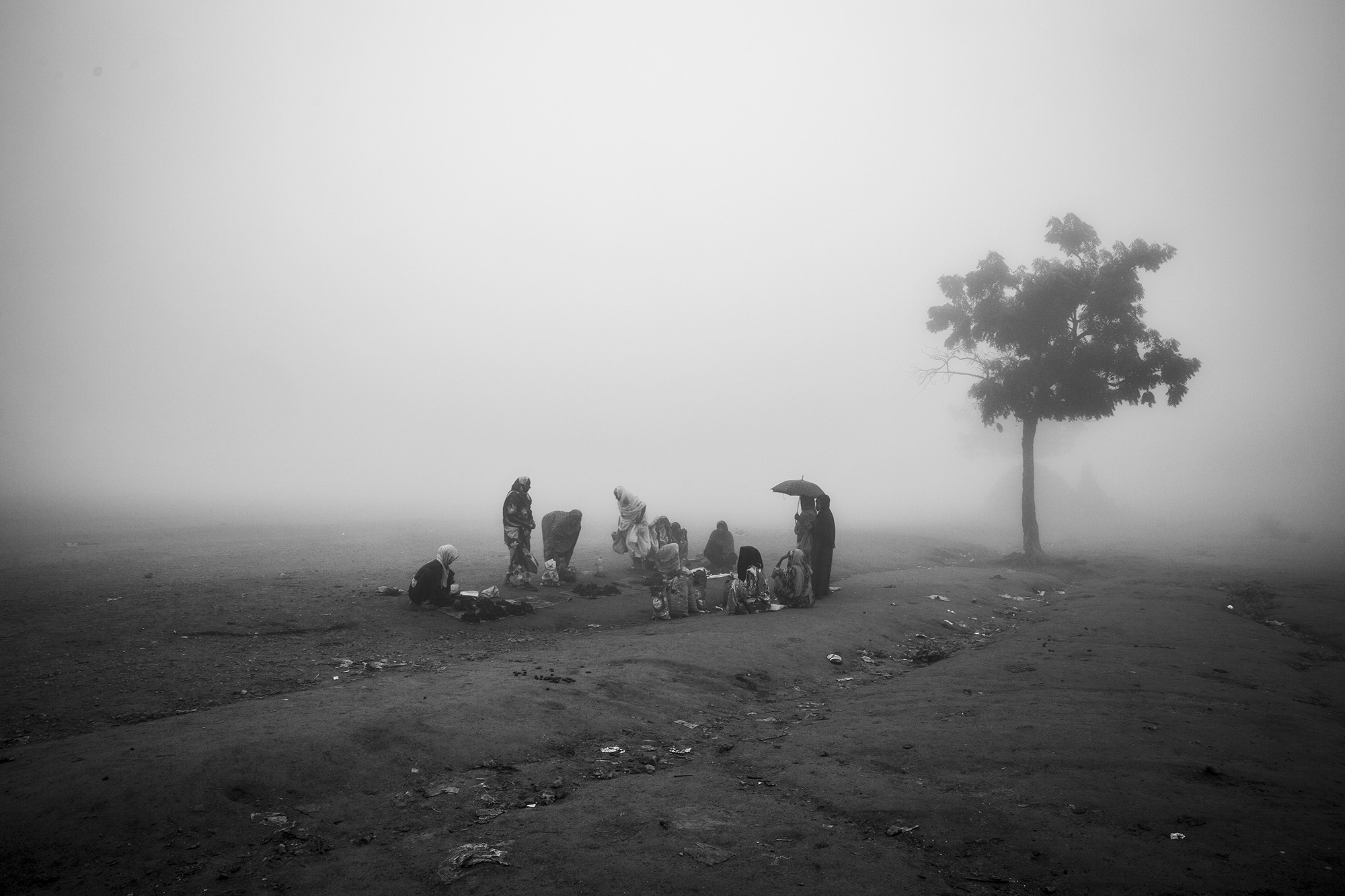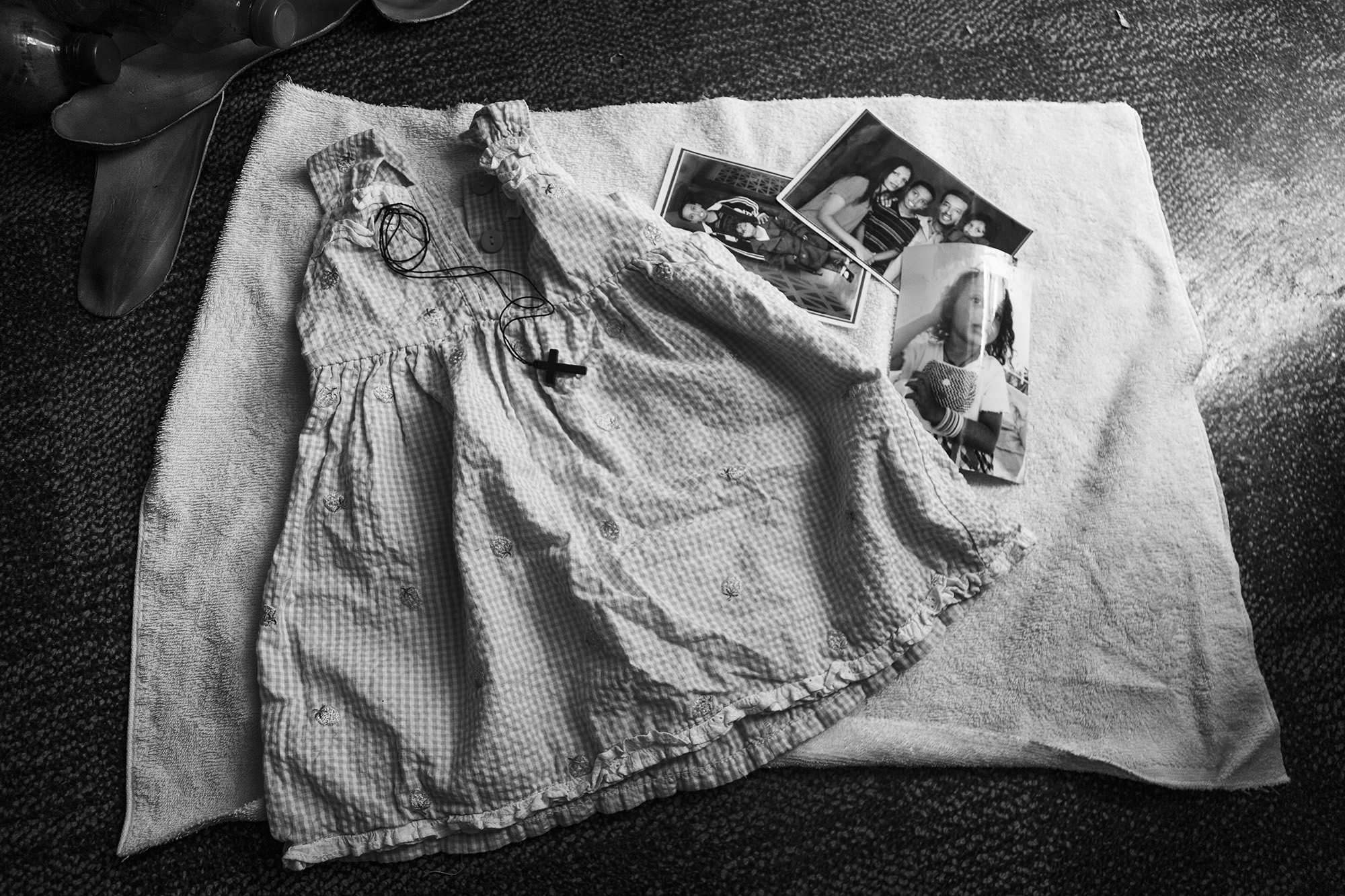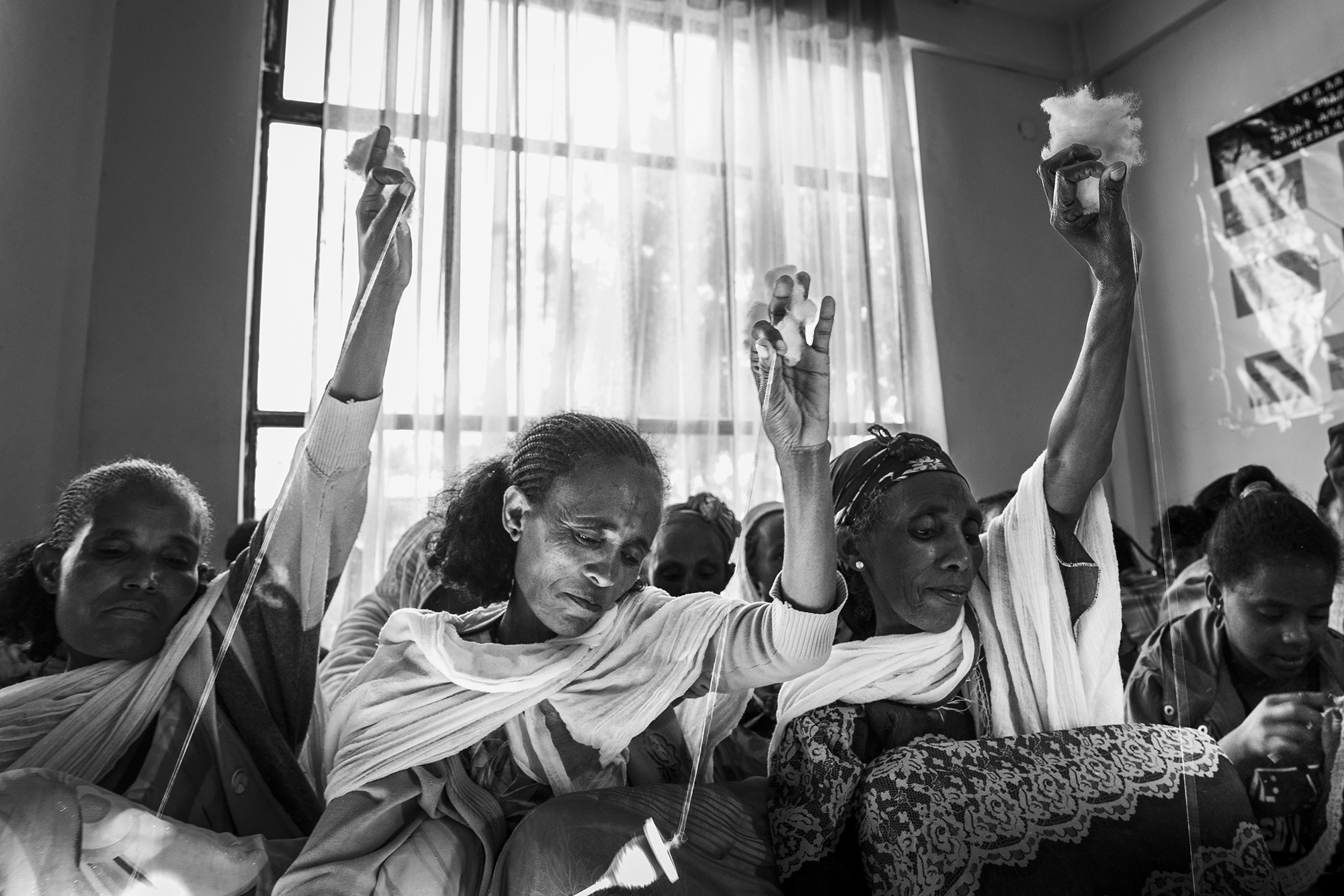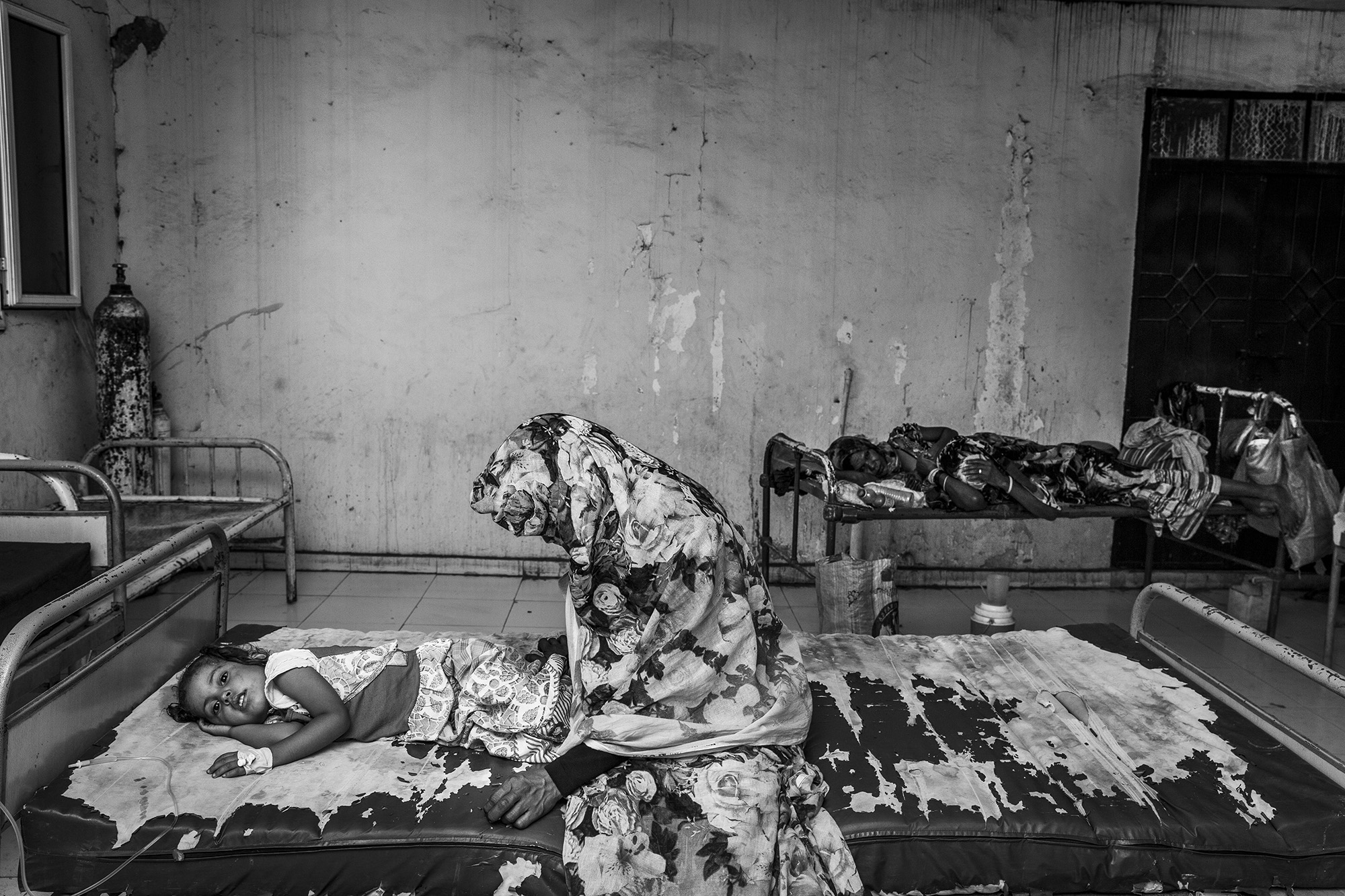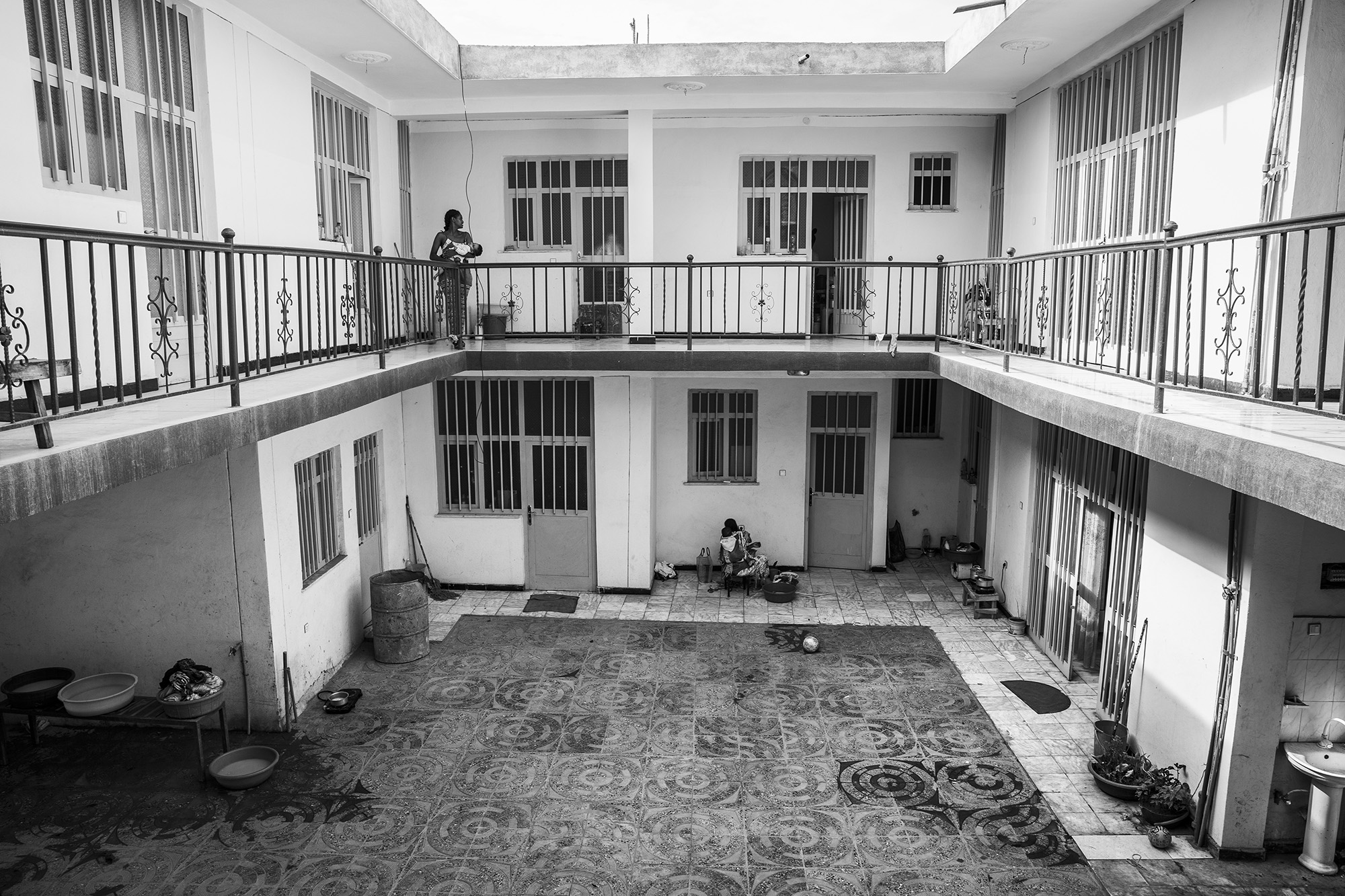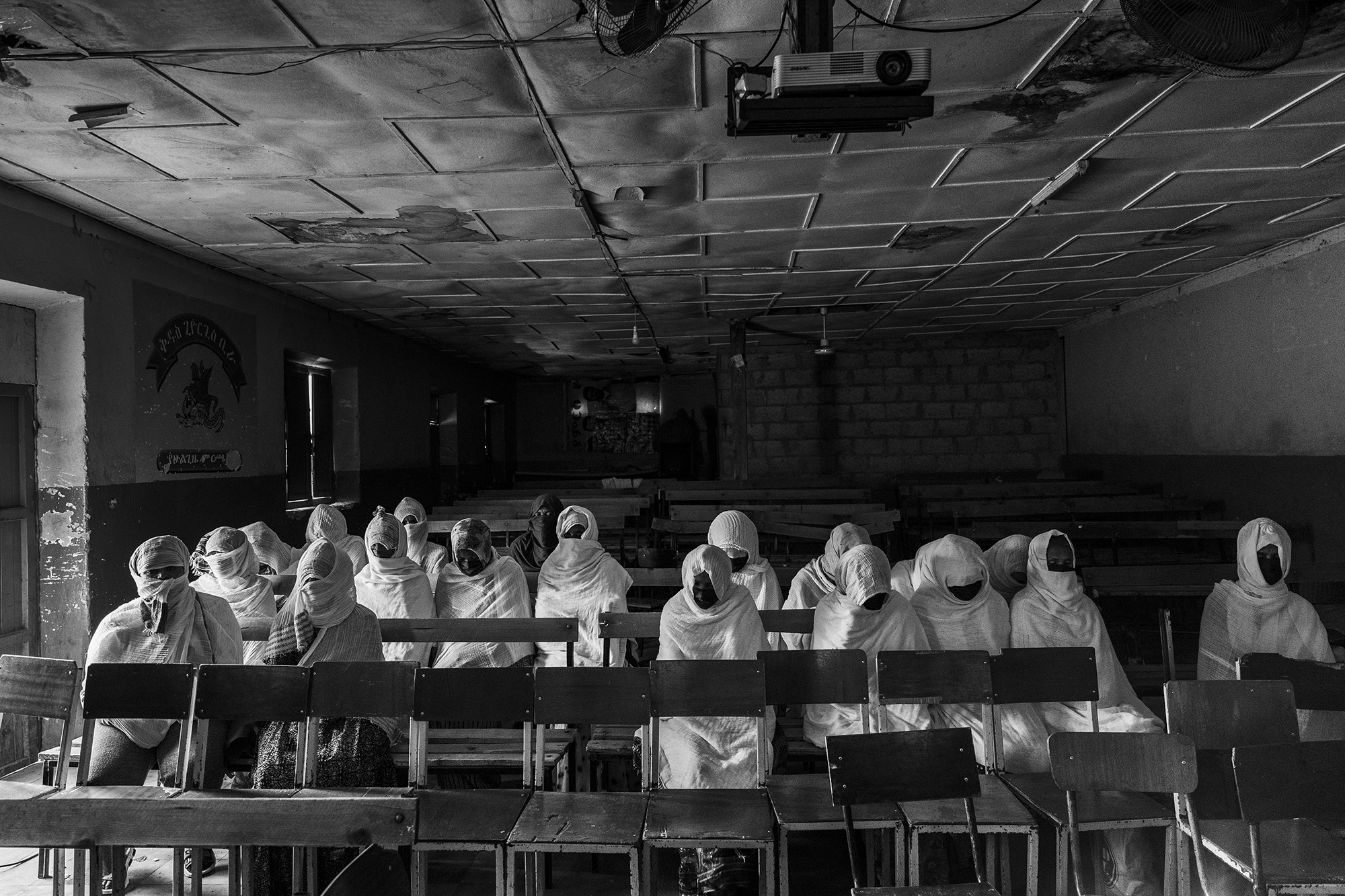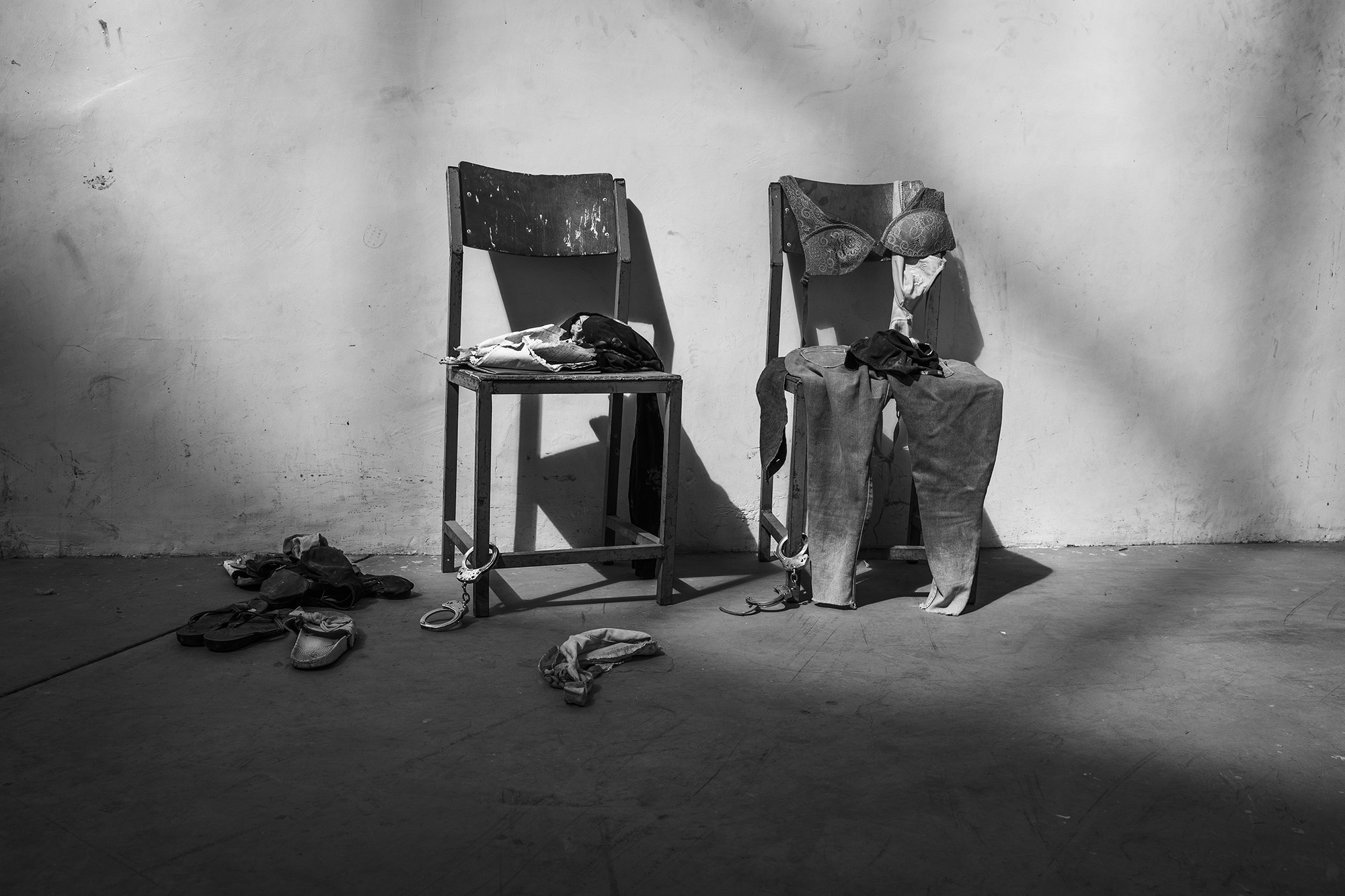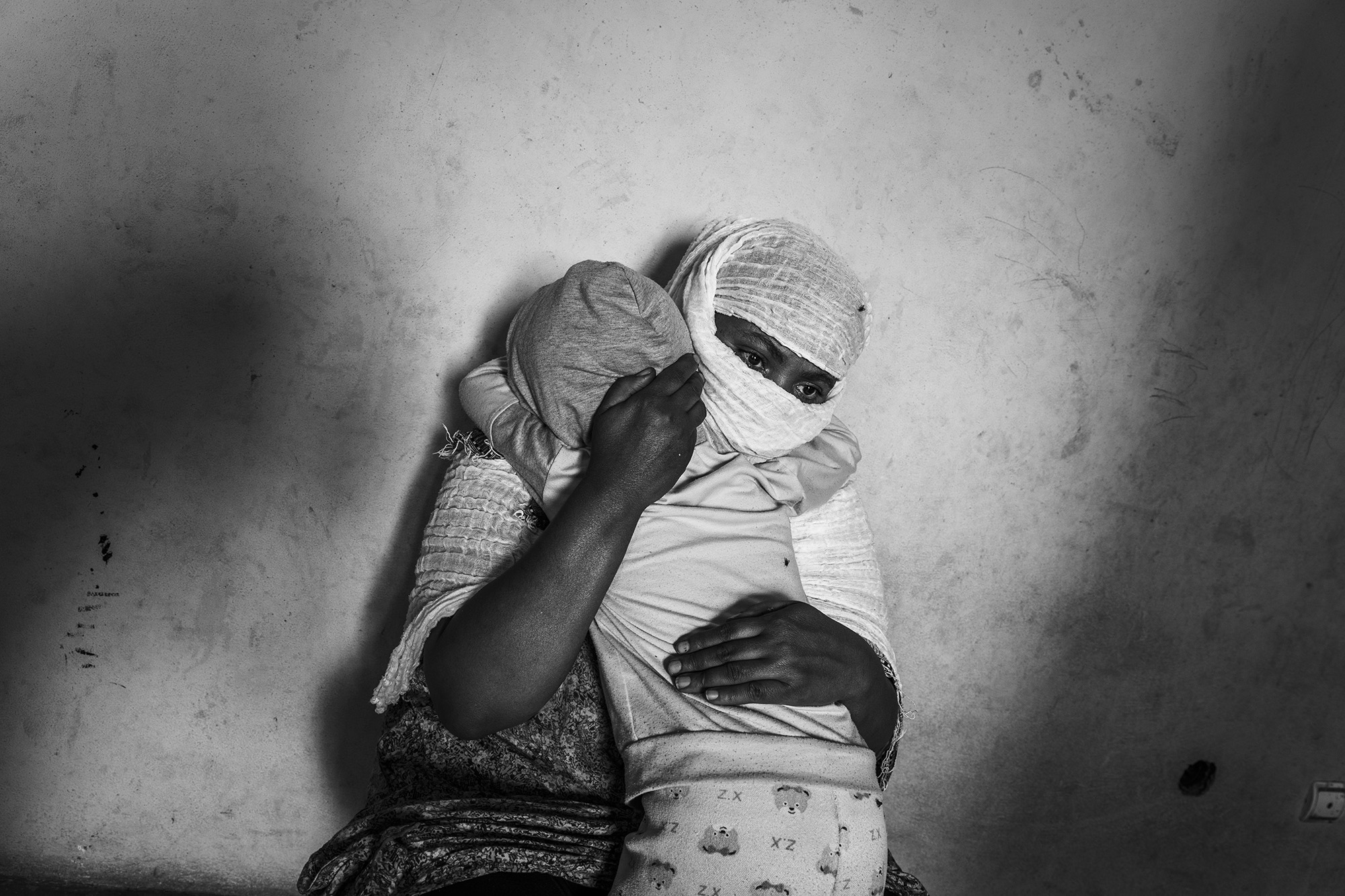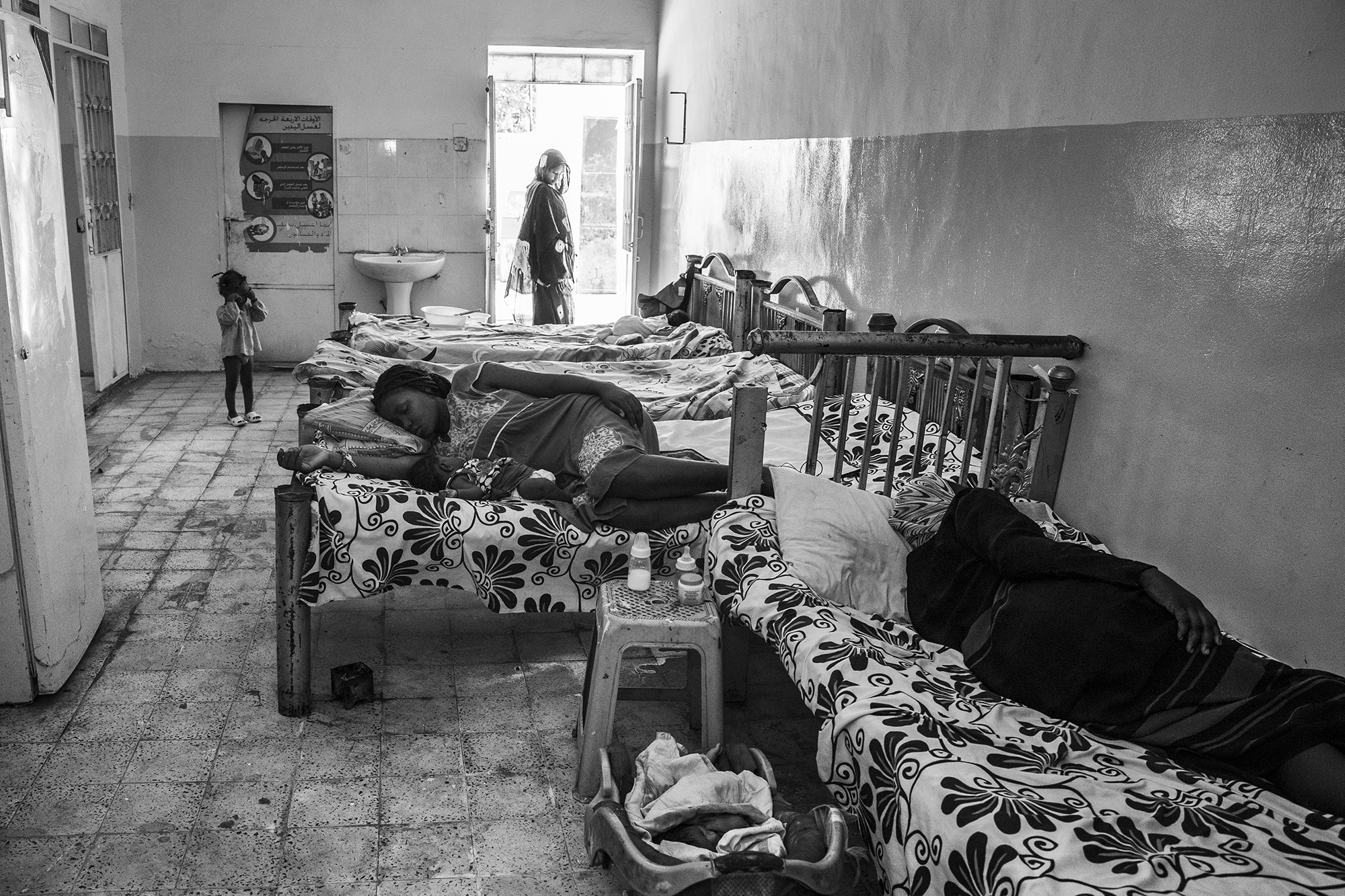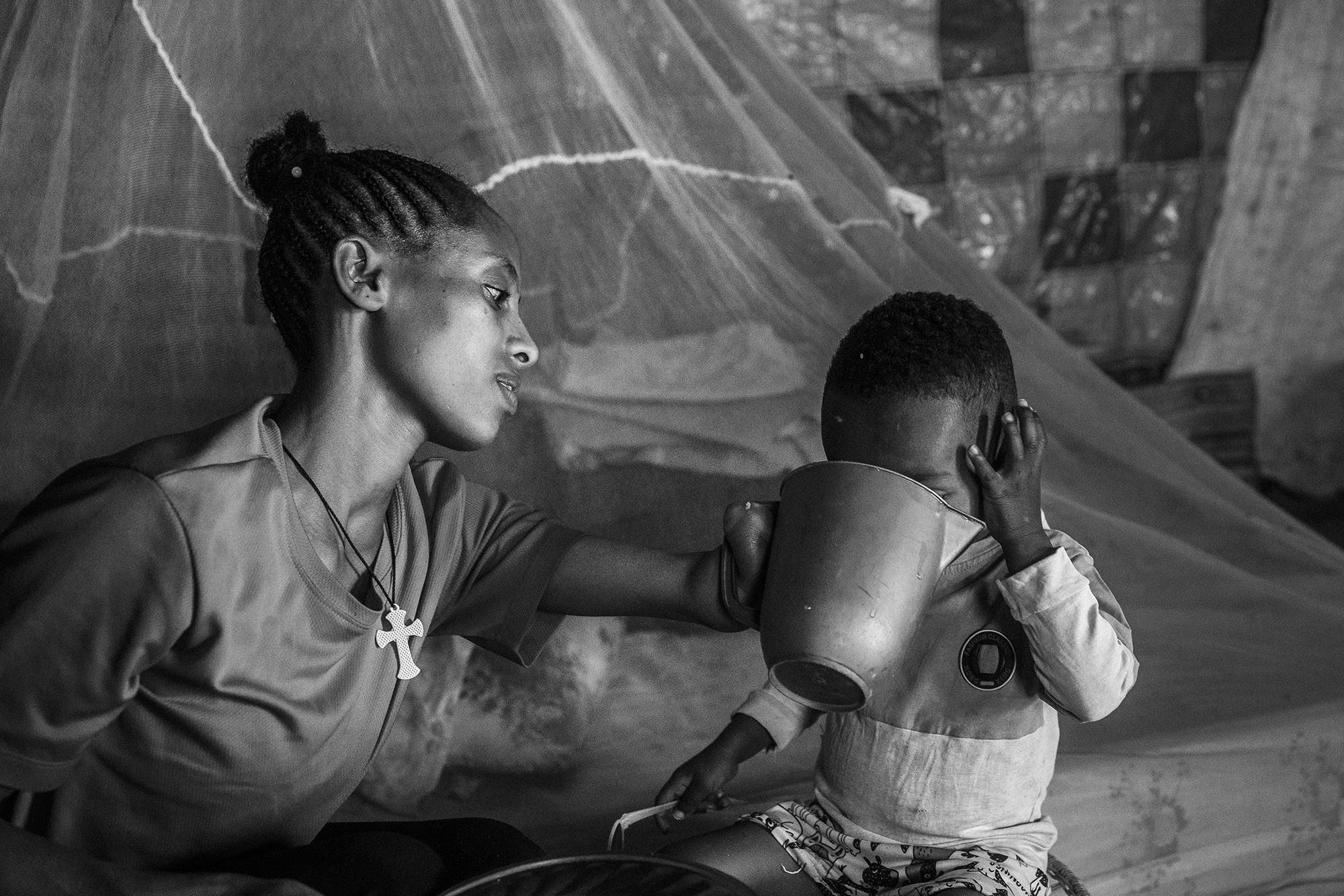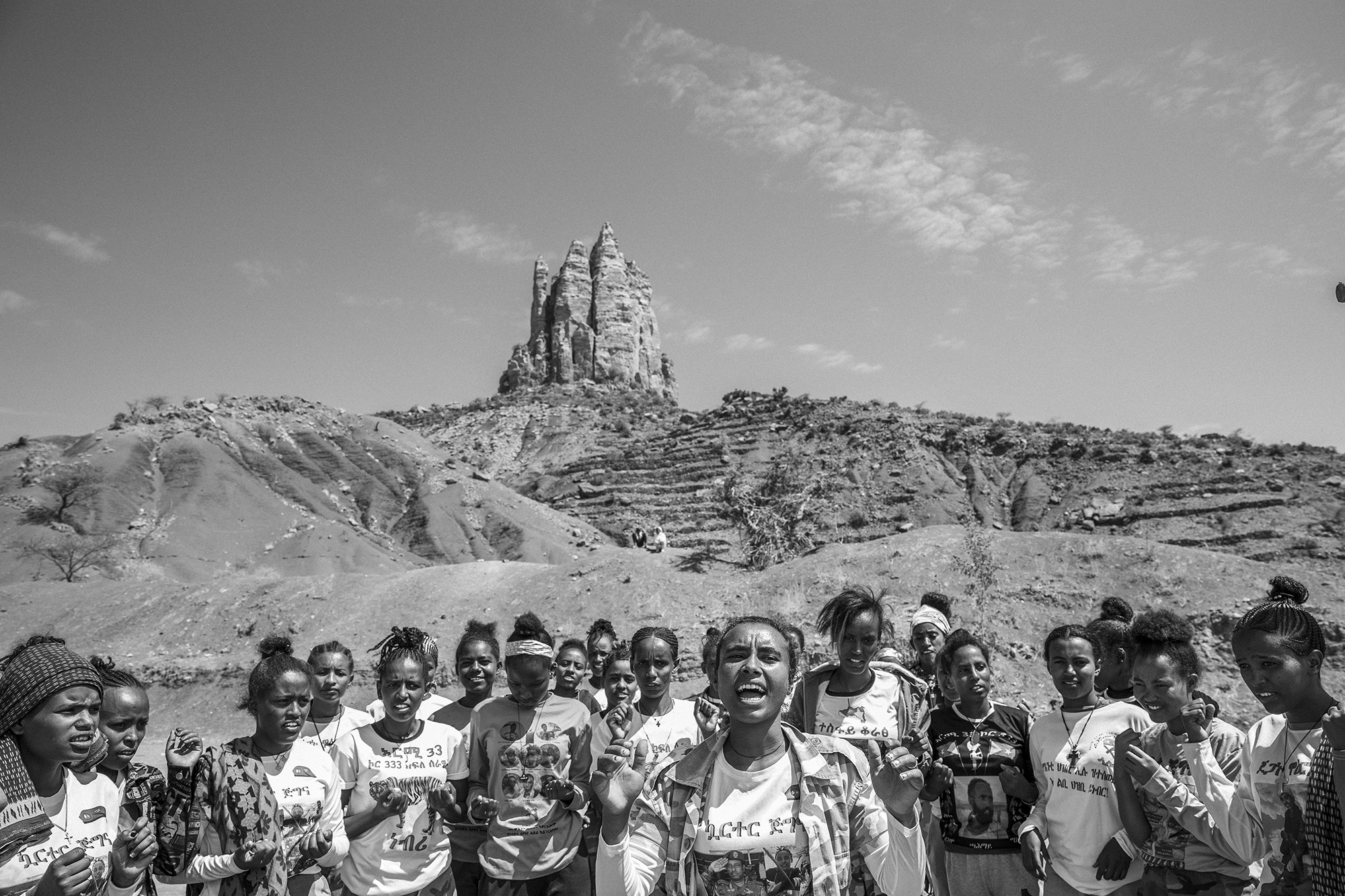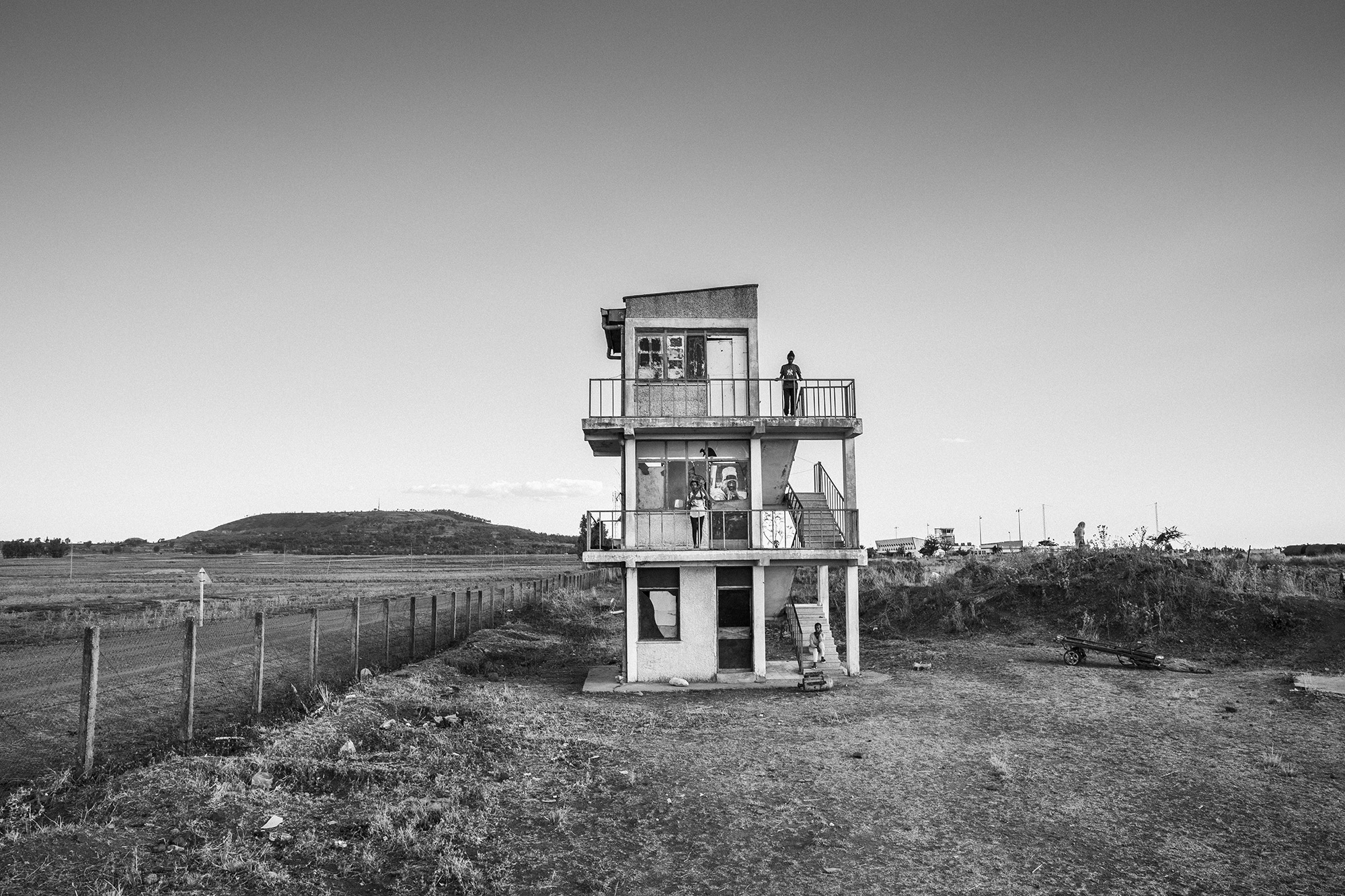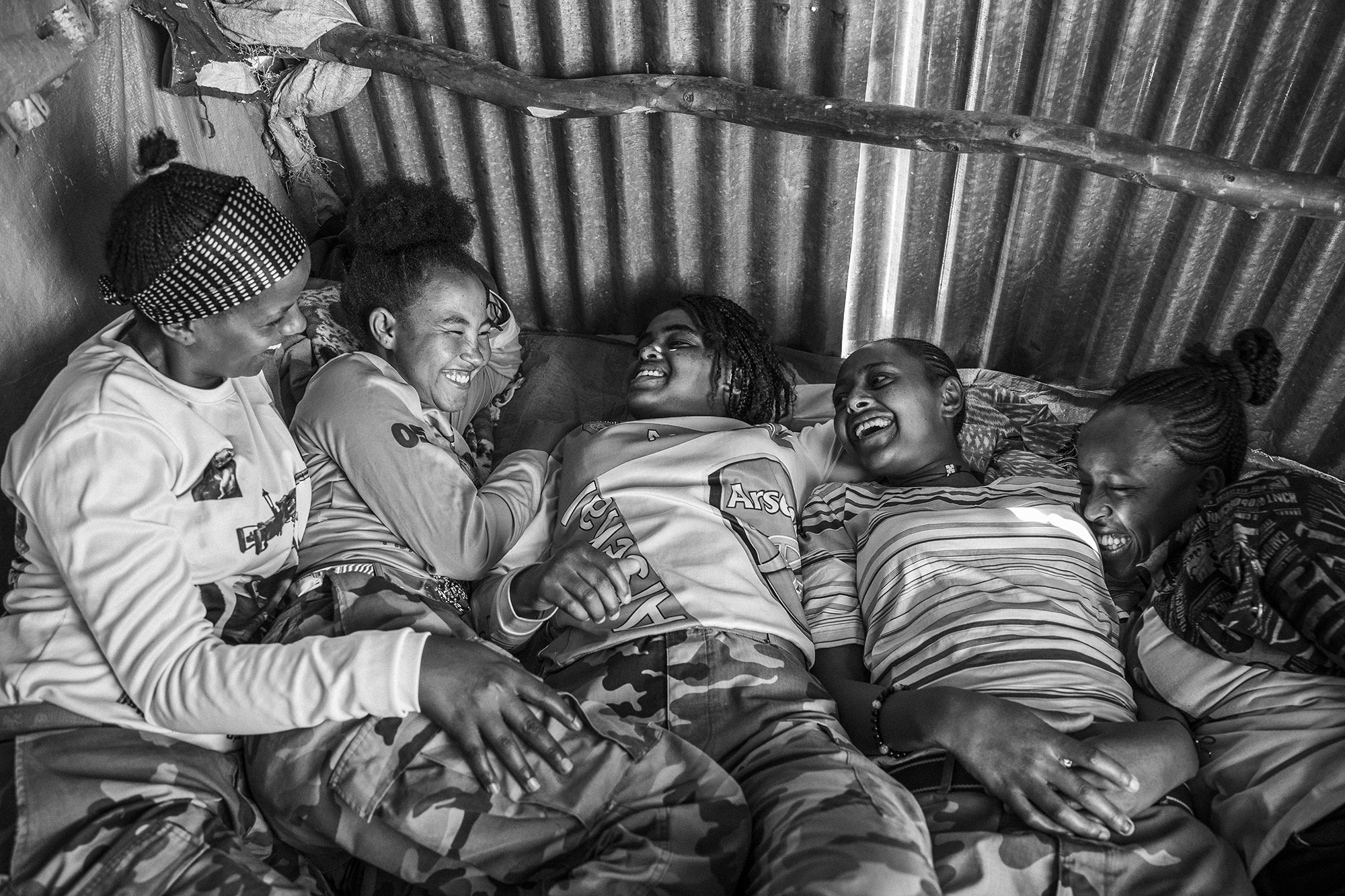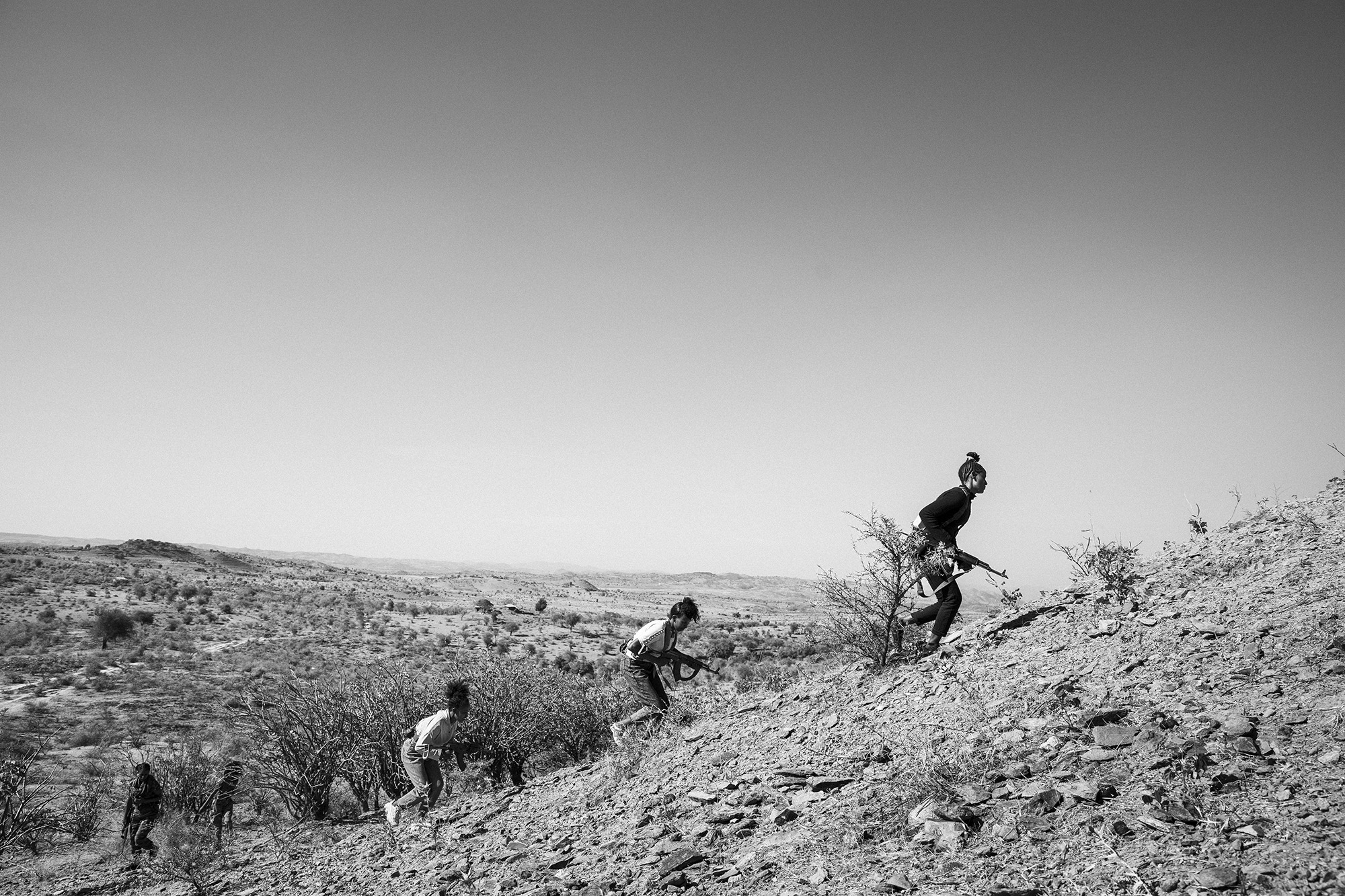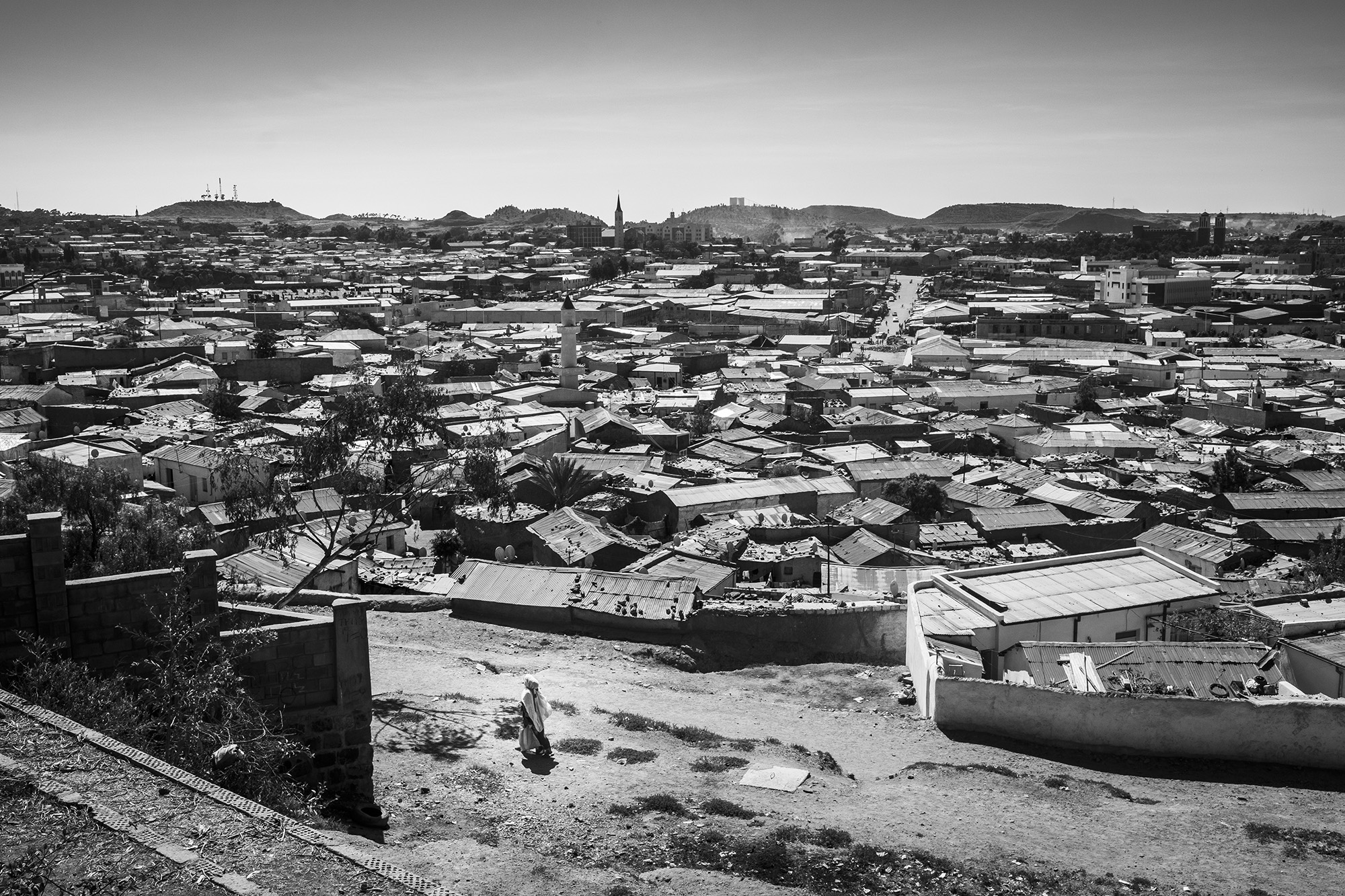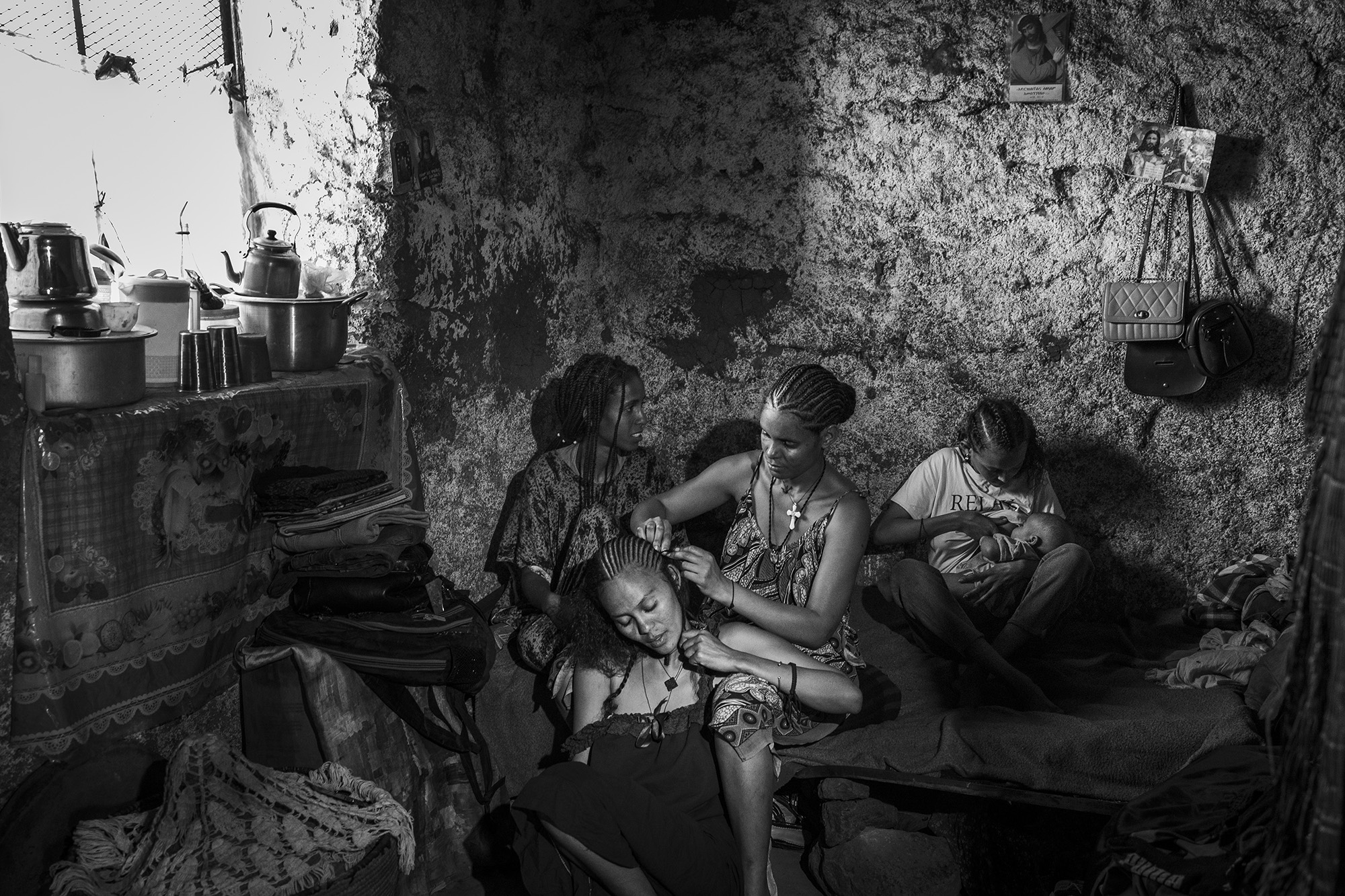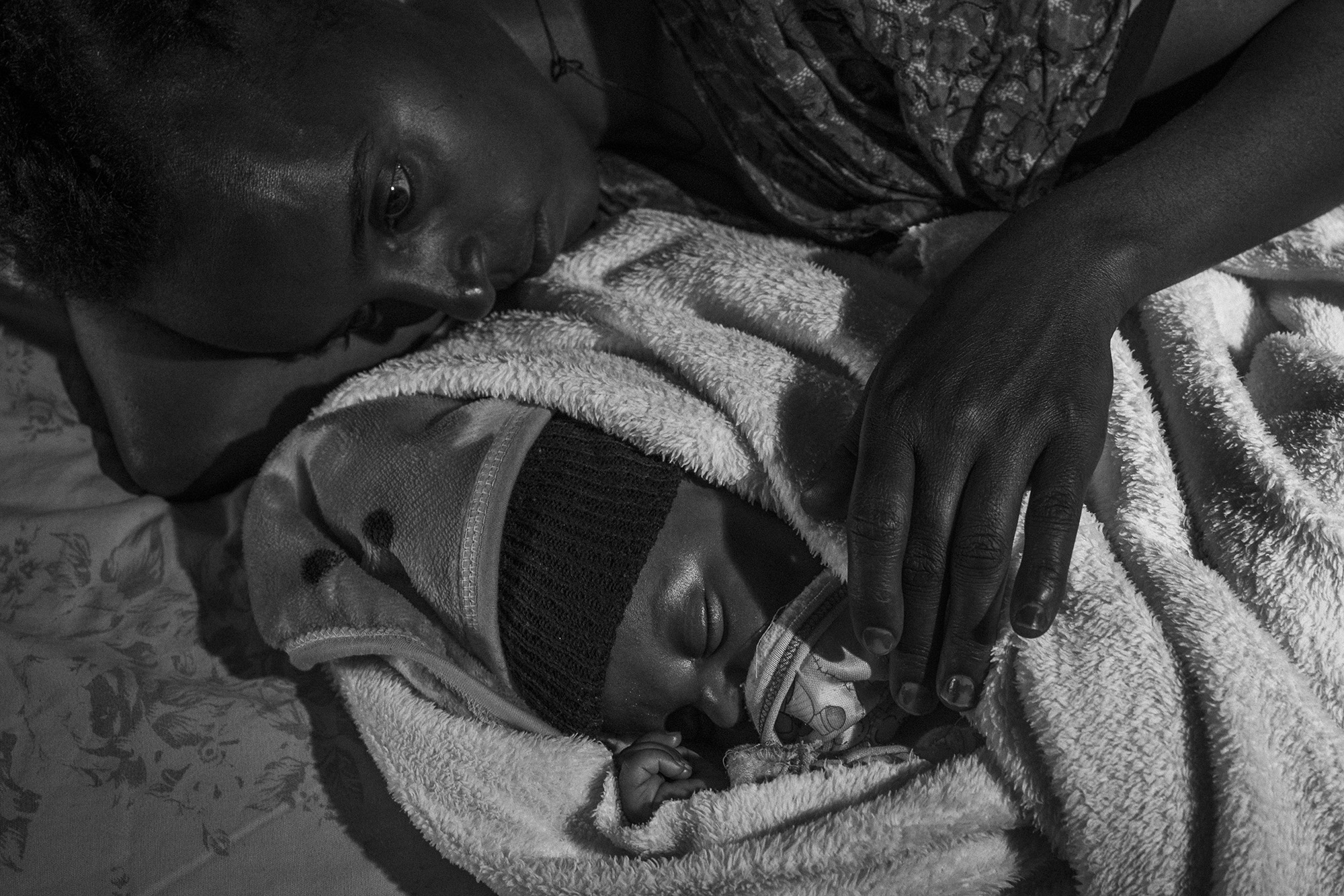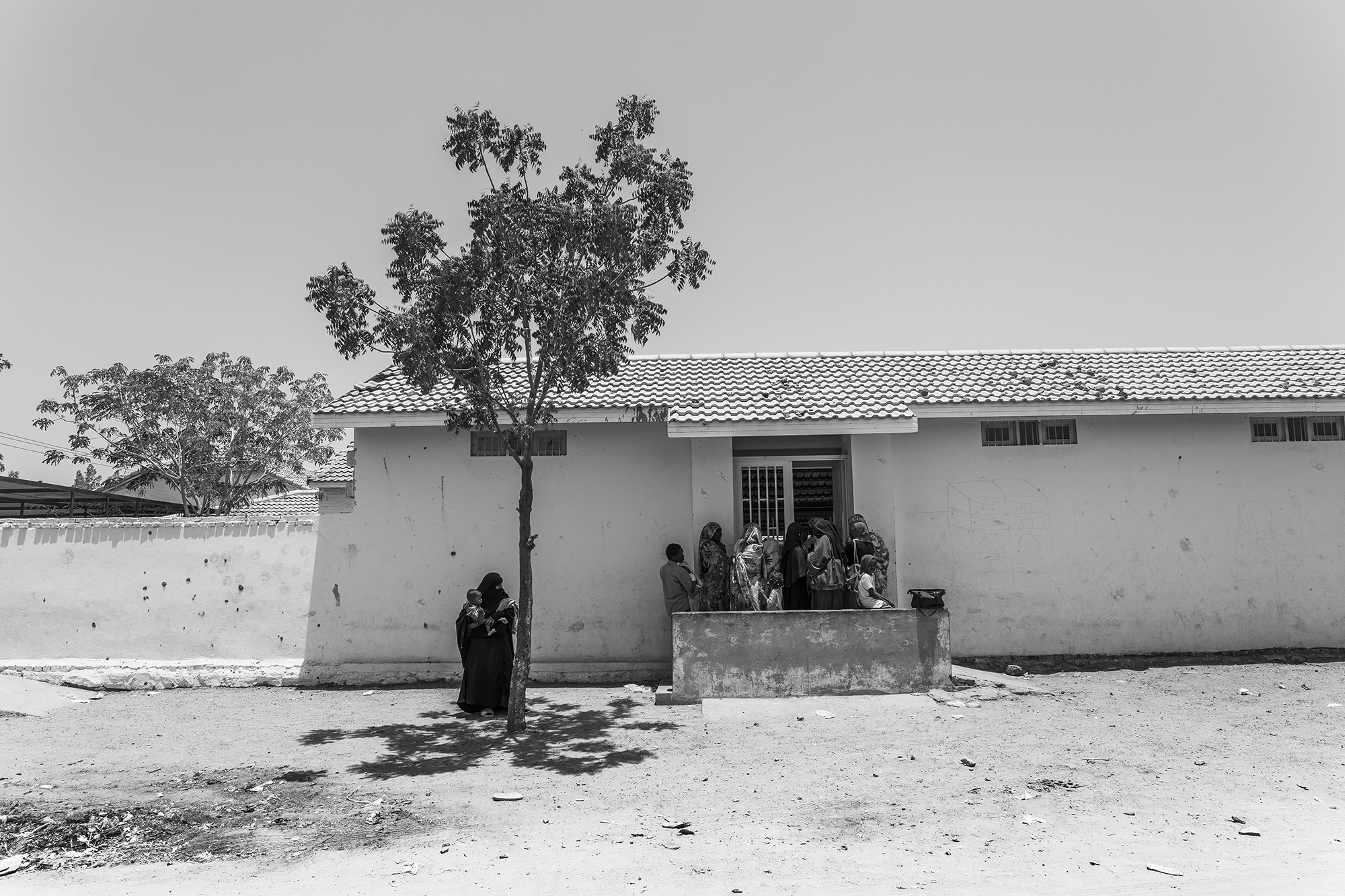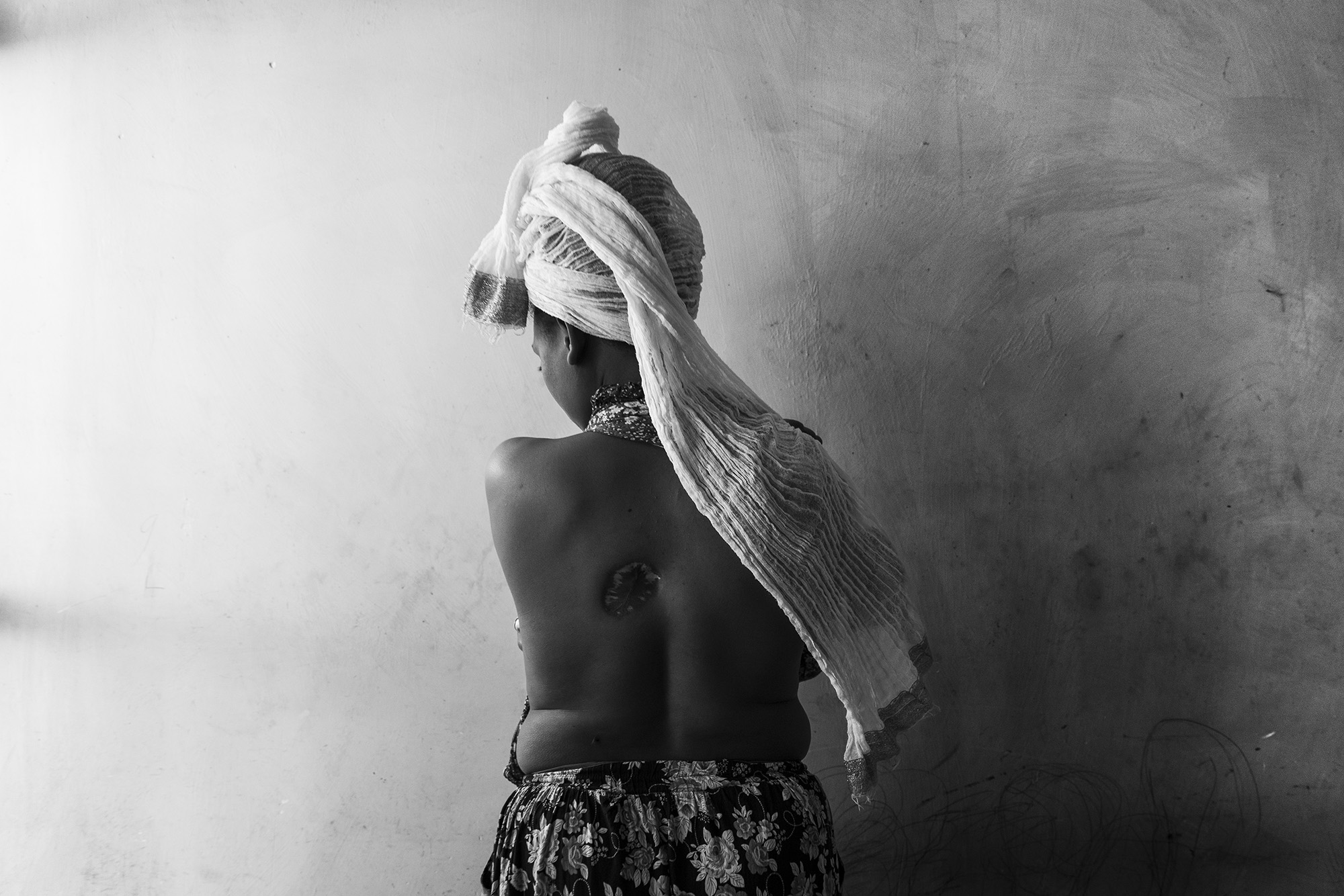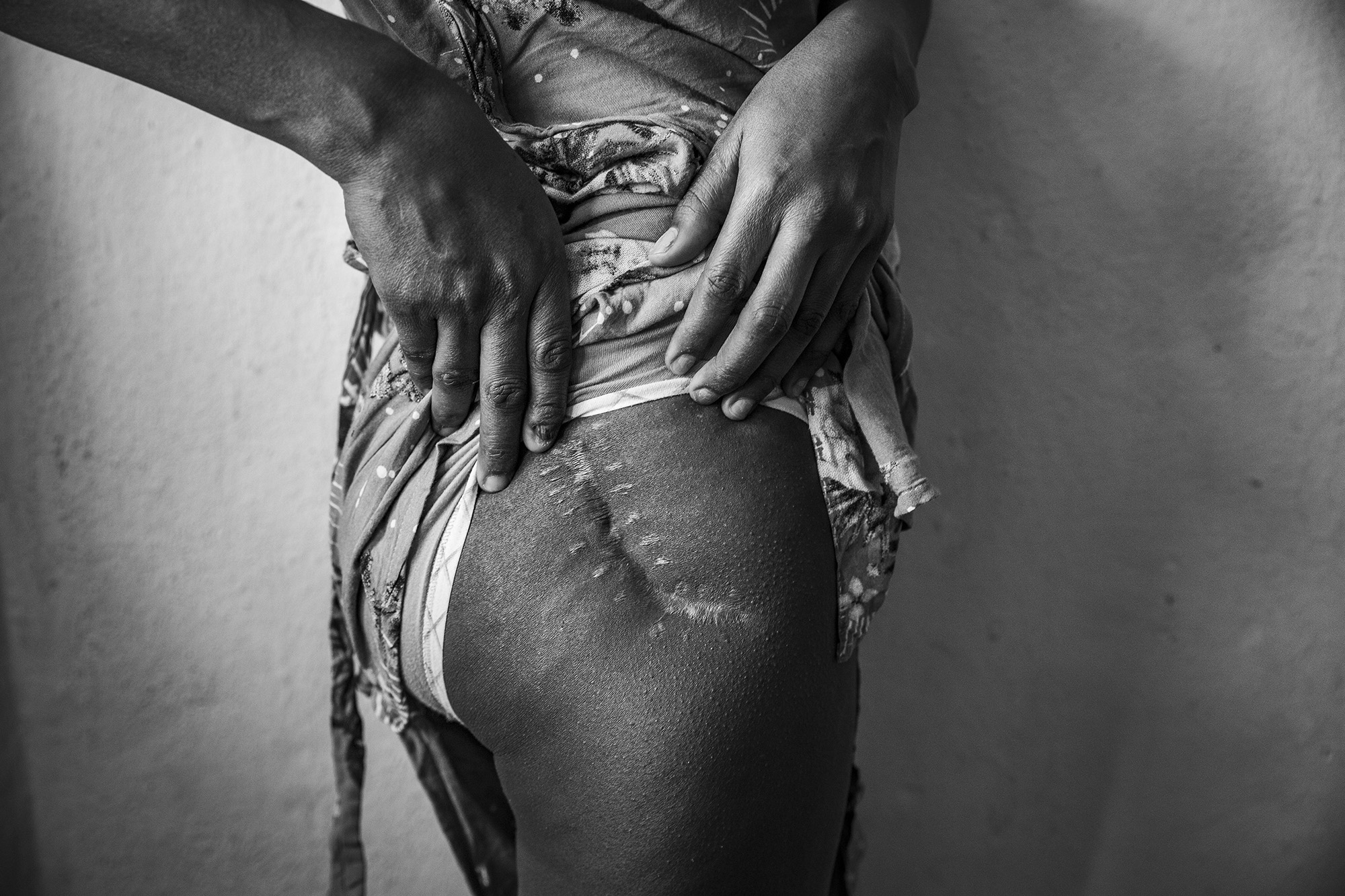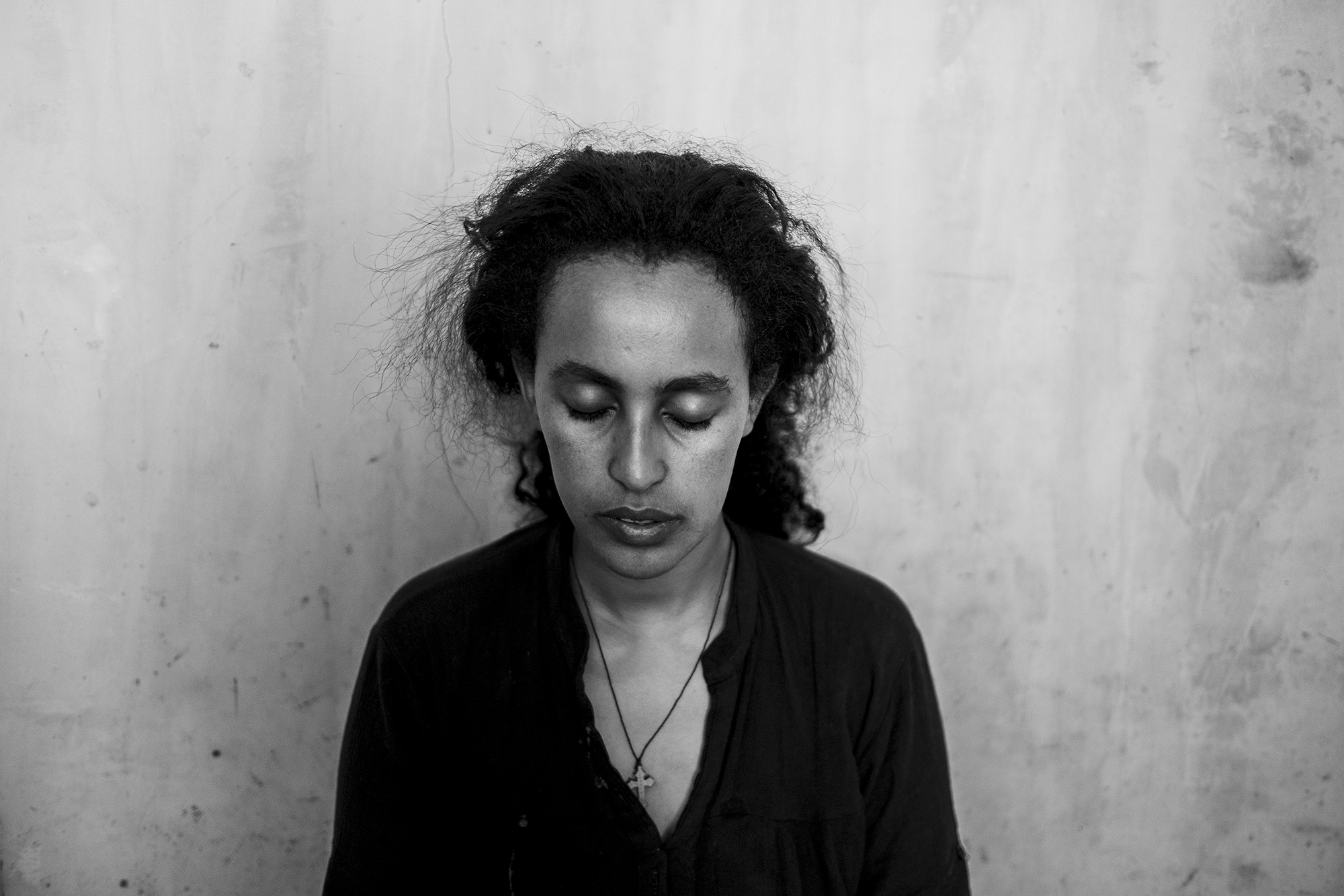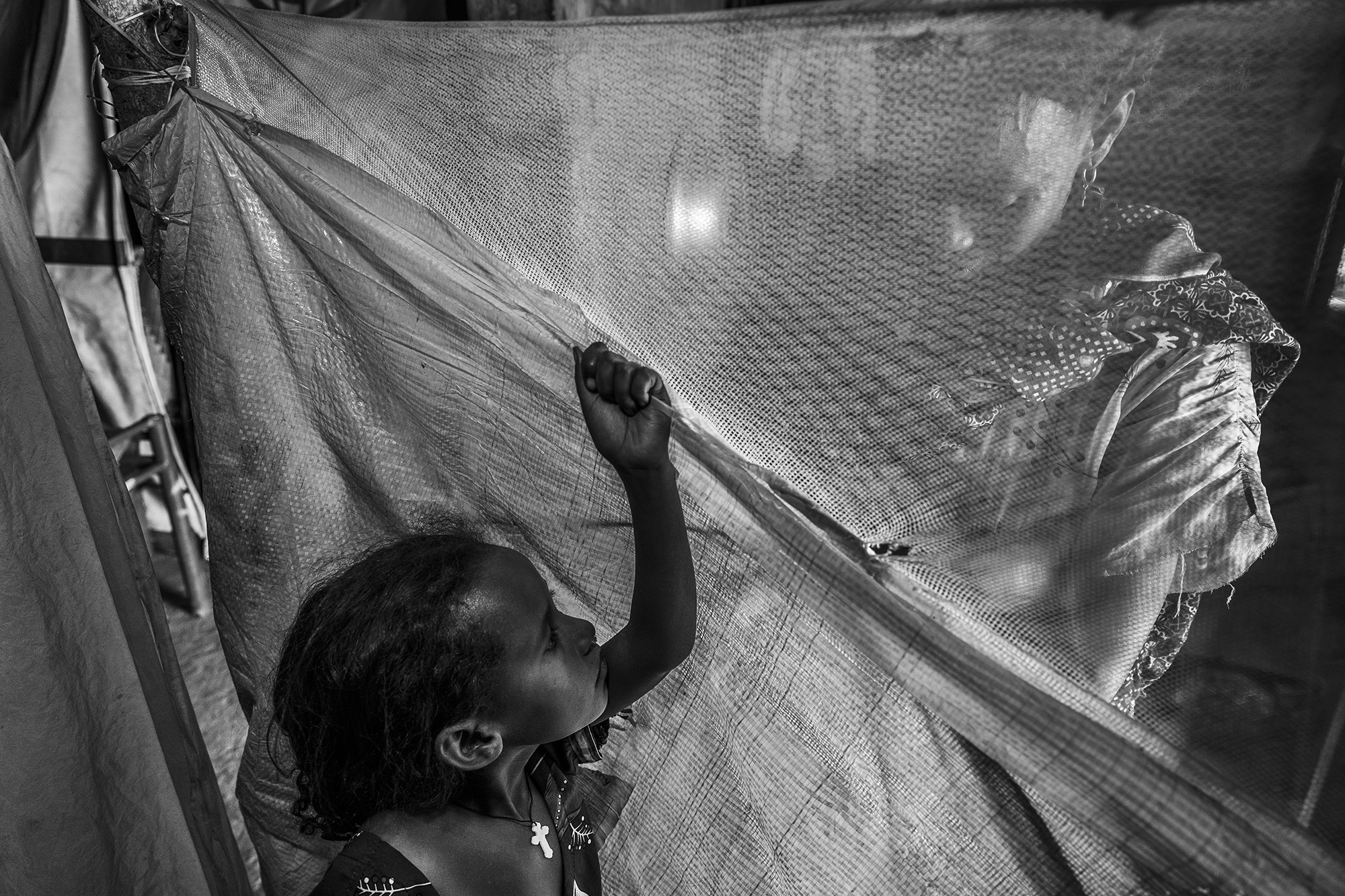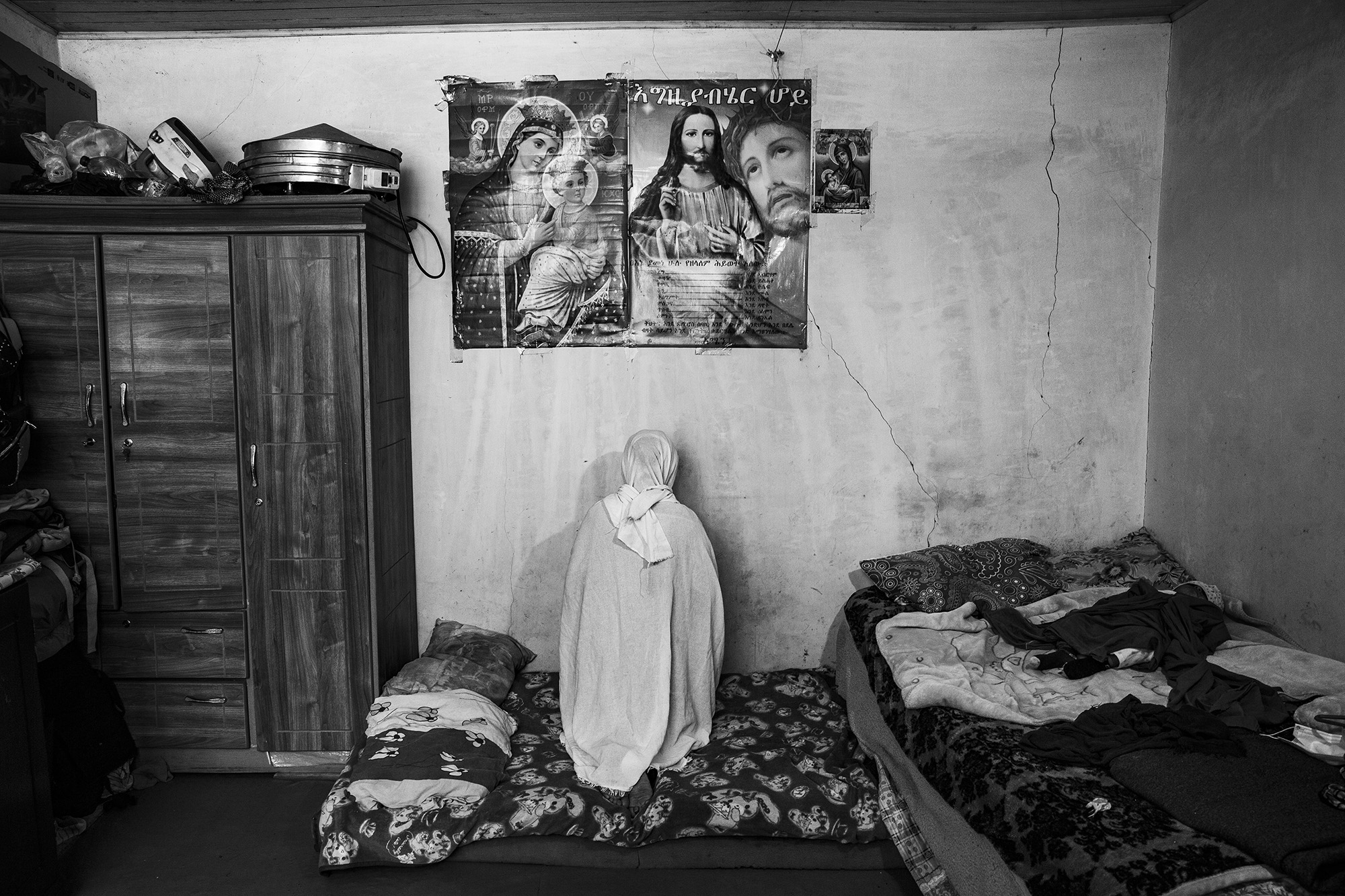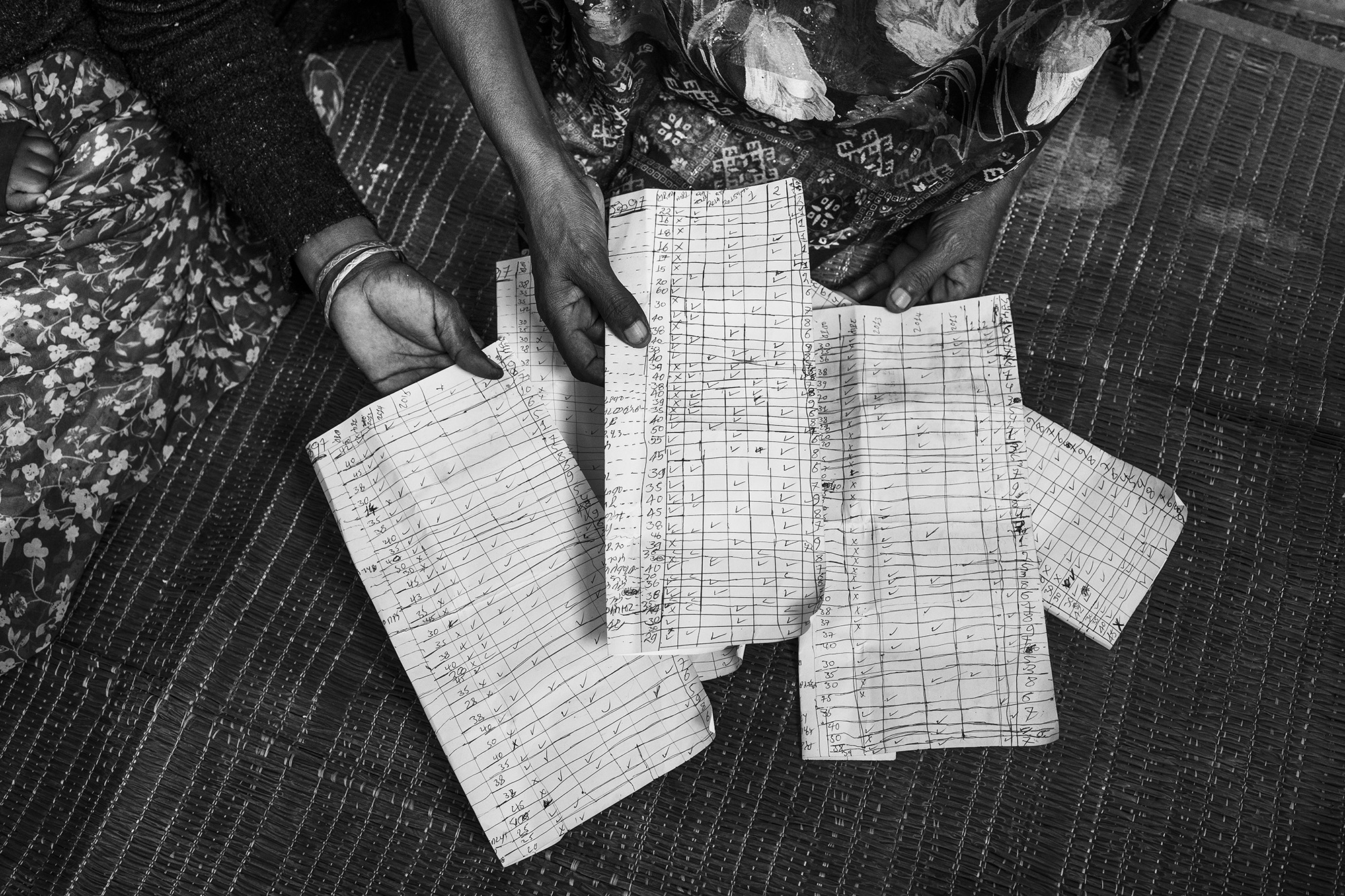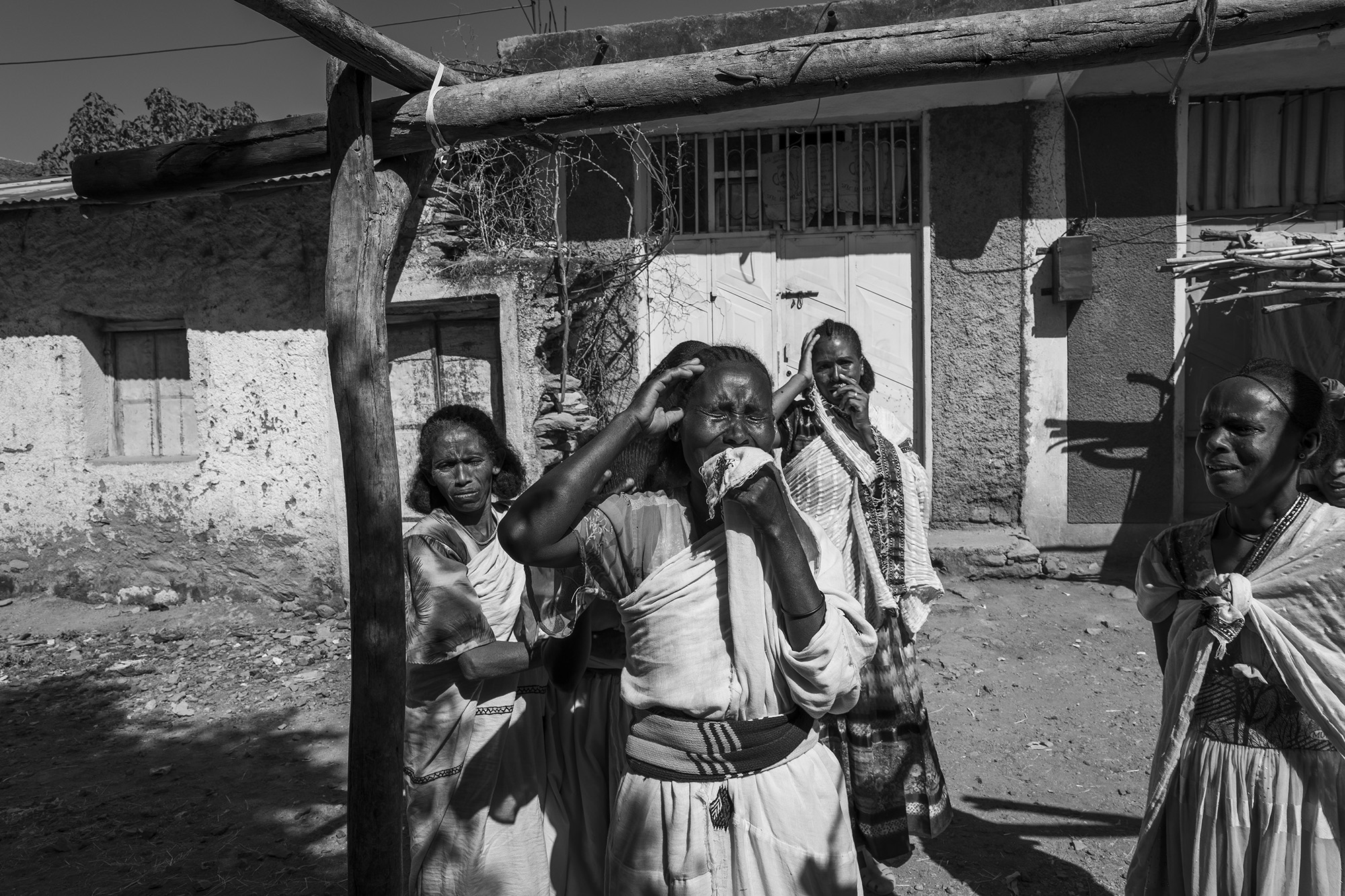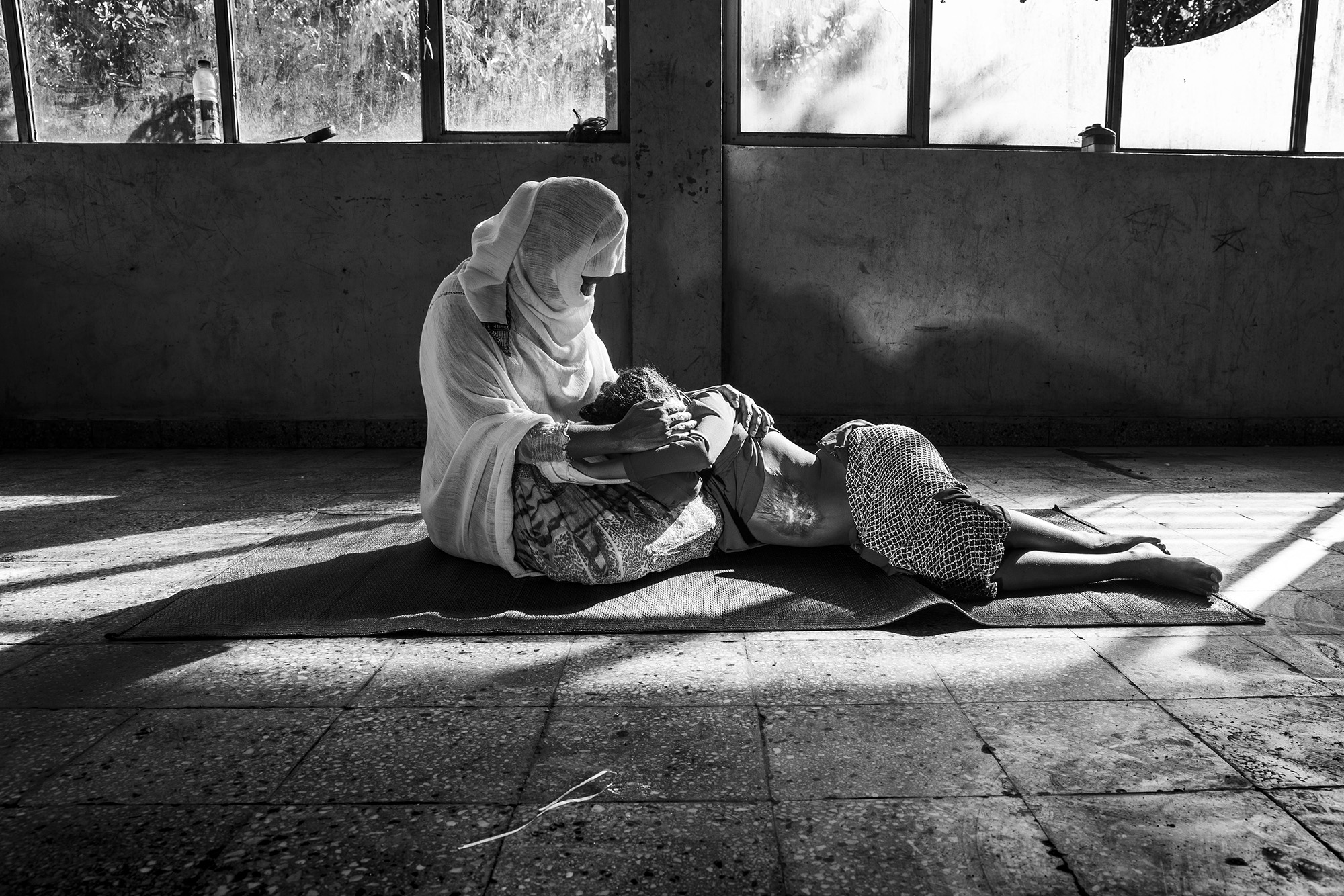As many as 600,000 people are thought to have died in the brutal war between Tigray and Ethiopia from 2020 - 2022, far more than the war in Ukraine. Yet it is a conflict that was and continues to be largely ignored by the world's media. A conflict in which women found themselves on the front line. At least 120,000 of them were raped in a systematic campaign of sexual violence with the secretary general of Amnesty International stating it was clear that rape "was used as a weapon of war to inflict lasting physical and psychological damage on women and girls in Tigray."
Yohanna (22) resting with her mother’s hand on her arm after receiving treatment for complications following the removal of a kidney. Girls attempting to flee Eritrea are often shot in the stomach by military police to prevent them from having children. Addis Ababa, Ethiopia. 31 October 2017.
A stillborn baby, whose refugee mother arrived at the clinic in critical condition; fortunately, she survived. Within a month of the outbreak of the war in Tigray, over 40,000 Ethiopians had already sought refuge in Sudan (UNHCR, December 2020). Hospital in Kassala, Sudan. 12 June 2021.
In 2017, Cinzia Canneri began documenting the experiences of Eritrean women who were fleeing their country and seeking refuge in Ethiopia. Young people in Eritrea have been migrating in huge numbers in recent years to escape a repressive regime that has implemented what is effectively an indefinite mandatory conscription. Many women caught at the borders were assaulted, raped, or shot in the stomach by national police to prevent them from having children.
As war between Ethiopian government forces (supported by Eritrean military and Amhara militia) against the Tigrayan People’s Liberation Front (TPLF) swept through the Tiray region, Canneri’s scope broadened to include Tigrayan women, who were now joining Eritrean women in their flight from northern Ethiopia to refugee camps in Addis Ababa or Sudan. Both groups have been the targets of systematic sexual violence – rape, shooting, torture – that, due to social stigma, limited health facilities, and journalistic access, remains insufficiently reported by news media and understood by the world at large.
Schoolchildren playing in the Sheraro refugee camp in the afternoon. Schools have re-opened, albeit in a limited way, offering the children increased socialization. Attending school gives them not only learning, but also emotional and social stability during childhood and adolescence. Sheraro, Tigray, Ethiopia. December 21, 2023.
Ethiopian women illegally crossing the river to reach Sudan. The Tekezé River connects Sudan, Ethiopia, and Eritrea. Following the 2018 peace agreement between Eritrea and Ethiopia, the Humera border opened for Ethiopians to travel to Eritrea, but not - except very briefly - for Eritreans to head to Ethiopia. The Tekezé River, Humera border, Ethiopia. April 2, 2019.
UN human rights experts have accused the forces involved in the Tigray war of crimes against humanity, especially for sexual violence by the Ethiopian National Defense Forces (ENDF), Eritrean Defense Forces (EDF), and Amhara militias. The EDF used sexual violence as a weapon of war, targeting Eritrean women as punishment and Tigrinya women for extermination.
Their bodies became battlefields with no sides.
Women who have experienced sexual violence are often rejected by their families and stigmatized by society — especially when the abuse has resulted in the birth of a child. Yet despite the pain and exclusion, many of them are finding the strength to come together, building a network of mutual support. Together, they are helping one another rebuild their lives and envision a different future — one that can also serve as a sign of change for society as a whole.
A Tigrayan woman holding a religious pendant belonging to her husband who went missing during the conflict in Tigray. She says “It is the only thing left of my past life”. When the bombing started, her husband joined the army after showing her and their two children how to escape. She has not heard from him since. Today she lives in poverty, supported only by the aid provided within the camp. Um Rakuba refugee camp, Gedaref, Sudan. 15 June 2021.
Women returning to their village after collecting the grass used in the coffee ritual. The coffee ritual is called Bunna-Bet and begins with grass being spread on the floor. Hawezen, Tigray, Ethiopia. 8 April 2024.
Regat (37) grew up in Eritrea and escaped to Ethiopia in 2010. She says “I left Eritrea partly to help my family with their deep economic troubles, but I can't see any future.” She currently works at a café, trying to save up enough money to reach Sudan but earns only 600 birr – 12 dollars – per month. Axum, Ethiopia. 4 April 2019
Hellen (22) showing the scars caused by a bullet shot during a military exercise in Eritrea. The incident was reported as accidental, but since it occurred after the Eritrean police stopped Hellen during her attempt to escape to Ethiopia, it is highly likely that the shot was intentional and intended as a punitive act. In fact, girls attempting to flee Eritrea are often shot in the stomach by military police to prevent them from having children. Hellen had made three previous attempts to escape from Eritrea but was always captured at the border. The injury has caused her multiple health issues but she is nonetheless traveling alone and hopes to reach Europe. Axum, Ethiopia 4th April 2019
“Three men came into the room where I was. It was evening and already dark… I did not scream; the gestured to me not to make any noise of they would kill me. They raped me one after the other… I was four months pregnant; I don’t know if they realised I was pregnant. I don’t know if they realised I was a person. “
Ruta (40), Eritrean, keeps this knife wrapped in a cloth under her mattress and showed it to Cinzia. Following the peace agreement signed by Eritrea and Ethiopia in 2018, she and her two children arrived in the Adi Harush camp in Tigray. Three soldiers entered her tent and stabbed Ruta in the back as she tried to defend herself from sexual assault. She managed to save herself and, once recovered, fled with her children to Addis Ababa. She says “I took this knife in case I needed to defend myself, and I still can’t get rid of it. My blood is on the blade.” Addis Ababa, Ethiopia. 8 December 2022.
Muslim women gather in groups as a measure of protection from possible attacks, because Muslims are persecuted in Eritrea. Their veils clearly distinguish them from other religious minorities, making them particularly prone to violence. Village next to Massawa, Eritrea. 23 March 2019.
Objects belonging to Rita (39) who fled from Eritrea in 2016 with her daughter, son and husband. Her daughter Elena died while crossing the border between Eritrea and Ethiopia: she was 7 years old and affected with a congenital liver disease which took her life during the journey. She was buried along the migration route, in a place that has no connection with her family. Rita says she would like to live where her daughter is buried, that “having moved away from my daughter's body means having lost her a second time”. Addis Ababa, Ethiopia. 6 November 2017.
Older women teach traditional weaving to younger ones, some of whom are survivors of sexual violence during the Tigray war. Through these activities, they support each other emotionally and often materially. (None of the identifiable women in the picture are victims of sexual violence.) Mekelle – Tigray – Ethiopia. 12 December 2023.
A mother taking care of her malnourished daughter in an emergency centre that welcomes refugee women and children in critical condition due to their journeys. Al Fashega, Gedaref, Sudan. 1 June 2021.
Women often leave refugee camps for urban centers, where they live in the same buildings and attempt to create communities to support each other. Communal living also helps protect them against gender-based violence, of which these women can become victims both during war and peacetime. Axum, Tigray, Ethiopia. 4 April 2019.
A group of Tigrayan rape victims is attending a lesson on small agricultural entrepreneurship. The session was organized by the Hiwyet Charity Association, a voluntary organization provides psychological, spiritual, and economic guidance for women who are victims of rape. Adigrat, Tigray, Ethiopia. 28 December 2023.
Objects belonging to Tigrayan women raped inside the Martyr's Memorial Monument Museum. The museum once held papers and videos -documenting the social and political importance of Tigrayans, their humanitarian initiatives, political and military activities, particularly their armed struggle against the provisional socialist military government of Ethiopia - known as DERG. When war broke out in 2020 the museum was pillaged by Ethiopian government forces to cancel that memory, and was turned into a prison where Tigrayan women were repeatedly raped and tortured. Before leaving Mekelle, the perpetrators tried to destroy the evidence of their atrocities here but nonetheless left objects testifying to their crimes. These have been collected and arranged to construct a new memory arising, that stems from witness to the violence perpetrated on Tigrinya's women. Today, nothing of the Tigrayan cultural history remains in the museum but it has become a testimony to cultural genocide. The Tigrayan platform Tghat reports: “This is cultural genocide. Nonetheless, Tigrayans – individually and collectively – would never forget our martyrs or allow our culture, history, and identity to be erased” (Cultural Genocide: The Destruction of the Martyrs’ Memorial Museum in Mekelle, July 2021). Mekelle, Tigray, Ethiopia. 25 December 2023.
Azmera was raped by three Eritrean soldiers in Zalambesa when the war began. Then, a few months after the Pretoria Peace Agreement (November 2022), her 5-year-old daughter was raped by an Eritrean soldier. Adigrat, Tigray, Ethiopia. 12 December 2023.
Unmarried Sudanese refugee women and their children reside in a shelter. In Sudan, having children out of wedlock is a crime with severe social consequences, even if the child was conceived through rape. Women impregnated by rape in Tigray often encounter social rejection and condemnation in Sudan. Khartoum, Sudan. 22 May 2021.
Yangus (24) giving drink to her son (2). She lost her left arm during the bombings when the war broke out. At that time, she was three months pregnant. When the child was born, her husband left her. Shire, Tigray, Ethiopia. 10 April 2024.
Marhawit (21), the leader of the girl soldier group, urging them to feel strength and self-confidence to liberate the Tigrinya people. Leaders play a very important role not so much in military training, but in emotionally supporting the young girl soldiers. Neblet, Tigray, Ethiopia. 7 April 2024.
Tigrayan army girls on a military observation structure. This camp is located next to the airport that was destroyed during the war. On November 28, 2020, a massacre occurred in Axum by Eritrean soldiers, resulting in around 1000 deaths and hundreds of women being raped. Axum, Tigray, Ethiopia. 12 april 2024.
Girls laughing with each other in a moment of rest in the military camp. The girls enlisted are very young, because girls who mostly had no children and felt more protected within an army than in their villages chose to join the army. Neblet, Tigray, Ethiopia. 7 April 2024.
A group of Tigrayan female soldiers engaged in a military exercise near the Eritrean border. Many of these girls joined the army amidst the brutal conflict, driven not only by the desire to defend their homeland but also by the need to protect themselves from the violence and atrocities surrounding them. After just 20 days of intensive training, these girls were sent to the front lines, where, despite immense challenges, they demonstrated extraordinary determination. Testimonies reveal that Tigrayan female soldiers played a crucial role, both as combatants and as emotional support within their battalion, showcasing remarkable resilience in enduring the harsh conditions of the conflict, marked by a severe lack of food, water, and basic resources. Military camp in Tzada Medri, Tigray, Ethiopia. 15 April 2024.
Entering Asmara, a peaceful atmosphere reigns. Everything seems in strong contrast to the stories of migrants fleeing this country. The espionage network is so widespread that it does not need policemen on the streets and the prisons are hidden holes within the city. Asmara, Eritrea. 22 March 2019.
Tigrayan girls in IDPs camp. Especially the younger girls dedicate a lot of time to self-care even in this period of difficulty and create moments of socialization that become an important resource to face the challenges they are experiencing. Shire, Tigray, Ethiopia. 19 December 2023.
Zemeda (30) with her son born a few months ago. She is a young single mother who chose to have this child alone when her partner told her that he would not recognise him. Shire, Tigray, Ethiopia. 27 March 2024.
Multifunctional center for the promotion of women's and child health services. Many organizations like OVCI, supported by the Italian Agency for Development Cooperation, work towards improving accessibility to healthcare services for women and their children. Their projects are developed to seek integration between Sudanese women and refugee women. Dar El Salaam, Sudan. May 30, 2021.
Letebrhan (21), Tigrayan, showing the scar from the bullet that hit her. She shot and raped by two Eritrean soldiers during the Axum massacre. The bullet entered in her stomach and exited on her backbone. Today she has serious breathing problems and post-traumatic stress symptoms. Between 19 and 29 November 2020, Eritrean troops operating in the Ethiopian city of Axum, Tigray, committed a series of human rights and humanitarian law violations, including killing hundreds of civilians. Over an approximately on 28-29 November, Eritrean soldiers deliberately shot civilians on the street and carried out systematic house-to-house searches. Axum, Tigray, Ethiopia. 20 December 2023.
Yemane (23), Eritrean, showing the scar she got while running away from a shooting during the war in Tigray. Yemane was living in the Mai Aini camp in Tigray with her husband, two children and a sister when the war broke out. She escaped with her family to the Dabbat refugee camp in the Amhara region. Upon reaching the camp, she was separated from her husband and raped in front of her children. The family reunited and decided to flee to Addis Ababa. Amhara soldiers shot at the group, wounding both Yemane and her sister; Yemane managed to get away with her children and her husband, but she still doesn’t know what happened to her sister. Yemane suffers from anxiety disorders linked to post traumatic stress and feels responsible for not aiding her sister. Addis Ababa, Ethiopia. 30 November 2022.
Merhawit (31), Eritrean, ran away from Eritrea and was living in the Mai Aini camp when the war broke out. With her three children, husband and brother she fled towards the Amhara region. At the time, she was a few months pregnant with her youngest child who was then born in Addis Ababa. Soldiers captured her husband and brother during this flight; she still doesn’t know what happened to them. Once in Addis Ababa she gave up her elder son to a priest’s care. She struggles to survive, gathering a little money by begging. Addis Ababa, Ethiopia. 3 December 2022.
Berhan (32), Tigrayan, hides behind a cloth, gazed on by a young girl who lives in the camp. Berhan was taken prisoner by Fano militia soldiers who raped her repeatedly several times a day for a month. Her husband was in prison in Addis Ababa during the war and knows nothing of what happened to her. Indabaguna, Tigray, Ethiopia. 17 December 2023.
An Eritrean woman praying in the shack where she lives. Eritrean women are generally religious and find comfort in prayer. When women arrive in Addis Ababa, they settle in temporary homes and try to find a job. Afterwards they try to move into more comfortable accommodations but many of them remain in precarious housing for years, risking even more sexual abuse. Addis Ababa, Ethiopia, 3 December 2022
Since the Ethiopian and Eritrean governments deny the sexual violence perpetrated, the women have started collecting data on their own. Guesh tells me, "It is not right to mask the truth that has cost us our lives. We want justice and we do not want to be ashamed of what we have endured." Sheraro, Legash (38) and Guesh (40) are victims of sexual violence and are currently staying at the Sheraro IDP camp. Soon after the outbreak of the war in November 2020, Legash was first raped by 5 soldiers, both Amhara and Eritrean, who took turns multiple times each. She was four months pregnant at the time and had a miscarriage as a result of the rape. In 2022, she was raped for a second time by three Eritrean soldiers and became pregnant with a child whom she gave birth to. Guesh was raped by two Eritrean soldiers and one soldier from the Amhara Fano militias. She became pregnant from this violence but had an abortion through traditional practices. Legash's husband is missing in the war, while Guesh's husband left her because of the violence she endured. Tigray, Ethiopia. 22 December 2023.
Tigrayan women mourning the death of a young man, Goitom Guesh Gebreselassie (27). He died during the war on January 16, 2021, but his death was officially confirmed by the Tigrayan government today. On 4 November 2020 the Ethiopian federal army militarily occupied Mekelle, capital of the Tigray region which had rebelled against the central government for having postponed elections for a year due to Covid. Tigray had held elections on 9 September 2020, but Tigrayans had not supported Abiy Ahmed, whom they accused of having used Covid to consolidate his power. The Ethiopian government responded by closing the region to all forms of communication and the presence of international organizations. Tigray, Ethiopia. December 21, 2023.
Kebedesh (38) and her daughter (11), Tigrayans. On 28 December 2020, during the war in Tigray, they were at home when four Eritrean soldiers arrived. They raped Kebedesh and threw a pot of boiling water at her daughter to silence her screams. Adwa, Tigray, Ethiopia. 23 December 2023.

